#it’s the alchemy with love story production and why does it go SO HARD
Explore tagged Tumblr posts
Text
Idk if anyone has heard the Love Story x The Alchemy mashup but it’s what you need to play to bring me back from the dead if I ever die. Btw
#it’s the alchemy with love story production and why does it go SO HARD#‘where’s the trophy HE JUST COMES RUNNING OVER TO ME (loud guitar)’ genuinely the most euphoric thing i’ve ever heard#makes me wonder how many more of these songs i’d absolutely love if the production was better tbh#(not that i don’t love ttpd. i do. i’m obsessed with it. but the production could be more exciting honestly#especially on most of the anthology. these are lyric-heavy songs and sometimes the lyrics don’t hit hard enough#because you’re dozing off because the production is not hitting!! i have to say it!!!! i’m sorry)
0 notes
Text
Writing Update/Art Update
Man, I have been bringing a real "do not feel like doing anything" vibe to this week and I really don't like.
Maybe it's because I finished both a) a long book series that I love that I have been working on re-reading/finishing since November (it's Temeraire) and b) a season-and-a-half long kdrama that Mr. P and I got completely obsessed with and spent hours and hours talking about (Alchemy of Souls). In the second case, I really thought the end of AoS was gonna leave us hanging and I was going to finally be able to write a piece of fanfic that was not Bleach, but it was very satisfying actually, and I haven't even wanted to *read* fanfic for it and I'm very disappointed in myself. (sorry to any other Park Jin/Maidservant Kim supertrash out there, if you even exist, I'm sure you would have loved me waxing rhapsodic about Jin's dreadful cooking)
How about your fanfic, Polynya, how is that going? Well...it could be worse, I guess. I did write some. I finished the scene I had not finished last week and wrote a few more. Then I happened to see a post complaining about a trope that I happened to be using and how it was dumb, and it honestly made me want to throw the whole thing in the garbage, because I am a dumb, sensitive baby! This is why I try really hard to never say negative things online!! Anyway, I will not throw it in the garbage, I will soldier on, but it really harshed my vibe, is what I am saying. Anyway, we are up to 15,545 words, which includes about 200 words of trash (trash is when something is not working and I keep my various attempts there for salvage purposes until I can get it to work), which is a little under 3k of progress for this week, overall not too bad. The story is also now twice as long as it was when I started working on it, so that's kinda nice, too. I've made about 7500 words of progress on it, which is about 1/3 of my way to my goal of 20k.
Speaking of harshing my vibe, my new computer was supposed to come tomorrow, but it was delayed and now will get here in two weeks. Maybe?? Who knows!! I feel like a good 50-75% of anything I order online anymore does not come when the website said it would come, in a way that feels like the website was lying to me to start with. This means that I will have to share my computer with my kids for the next two weeks. It's probably for the best, because I'm sure I've been wasting too much time in front of the computer lately anyway, and maybe this will help me to treat compy-time like some sort of precious commodity. (lol, it probably just means I'll spend more time on my phone, being even less productive)
I started a drawing. It's not going well. Once again, I am soldiering.
I did have an idea to go with one of the Bleach Returns prompts. Remember when I said I was gonna try to go outside my usual bounds a little bit? Ha ha, it was a lie, it's a Renruki story. I haven't started yet, but I'm hoping to give that a go this week and see if I can spin anything out of it.
Anyway, that was my week! It's summer now! Be sure to sign up for your library's summer reading program! I already earned a cool tote bag.
12 notes
·
View notes
Text
Dramas I quit
I tend to quit watching things due to my own personal quirks that I don't think too hard about. Me not liking something does not equal a judgement against people who do like it.
Also, there are SO MANY other shows that I want to watch, that if I struggle with liking a show it doesn't seem worth it to keep going. I'm like that with all of my entertainment sources, honestly. I only have so many hours in the day to give to entertainment, I kinda hoard them for the stuff that grabs me.
Dropped After Watching More Than a Couple of Episodes
Alchemy of Souls (Korean)
IDK, when I heard the FL actress was being replaced for season 2 I kind of lost interest. What I heard later about s2 didn’t change my mind.
Ancient Detective (Chinese)
I only have a couple of episodes left, but I know it’s not going to go the way I want it to (with the ML and his hot, derpy side-kick being each other’s most important person and going off together to have adventures and maybe eventually do that friends-to-lovers trope). So eh.
Angel’s Last Mission: Love (Korean)
I just fast-forwarded to the whump scenes.
Bring it On, Ghost (Korean)
Ok Taecyeon does not do it for me. I don’t know why.
Bulgasal: Immortal Souls
I cared 0% about the love story, which was unfortunately at least 80%+ of the show.
Candy Color Paradox (Japanese)
This is one of my absolute favorite manga series, and a large part of the reason why has to do with one of the ML’s tendency to do super awkward, dorky, sometimes cringey, but always endearing things. It’s a HAPPY manga, with such sweet romance, and the show has none of that. The quirky ML has been turned into a wet dishrag, and the romance is weird and flat.
Come and Hug Me (Korean)
My main issue was that the short episodes made it hard for me to get hooked. I might come back someday? IDK. Side note: How many serial killer fathers are there in Korea?? There are so many shows with serial killer fathers! Or at least murderer fathers. *side-eyes Korea*
Desire Catcher (Chinese)
This is a master class in “how to completely waste the character with the ~special skill set.”
The Golden Eyes (Chinese)
I got bored.
I Remember You [Hello, Monster] (Korean)
I was struggling because every time the meaty elements of the show – the main character’s search for and relationship with his little brother – started to get good, we’d shift to the romance. I didn’t hate the romance – before the younger-brother plot line really revved up I actually liked it a lot – but it felt like a separate story, and the story I ultimately became invested in was NOT the romance. Then in episode 13? 12? SPOILER the ML leaves his little brother to be taken home from the hospital by the serial killer who kidnapped him years ago, so that the ML can go support his not-even-a-girlfriend despite the fact that she has a whole big support system already but little brother only has him and the serial killer? I got mad and rage quit.
K2 (Korean)
I love Ji Chang Wook, and I love the action, and I love the bizarre relationship between his character and the older FL. But the younger FL drives me up the wall. I couldn’t finish it. I tried just fast-forwarding to the JCW parts, but the younger FL became too ever-present.
Love in the Air (Thai)
Cute? Ish? But the acting and production quality were kind of terrible.
The Secret Romantic Guesthouse (Korean)
I tried for about four and a half episodes. It’s not bad, but there are just other shows I want to watch more.
The Sleuth of the Ming Dynasty (Chinese)
I almost rage quit when the ML was left to wake up alone after being kidnapped and horribly injured because his friends were like “you slept too long and we got hungry so we went out to eat.” What. The hell. And then a couple of eps from the end the ML made a(nother) mistake and people where kind of assholes about it. And I had to stop. It made me sad.
Wu Lin Heroes (Chinese)
I just watched the whump scenes. The FL was annoying.
Dropped Almost Immediately
Are You Safe (Chinese)
So cheesy. Like. Basically a PSA from the government on how to be smart on the internet.
Being a Hero (Chinese)
It just didn’t grab me.
Blood (Korean)
Ehhhh. I may give it another shot later because I occasionally think to myself “I really want to watch something with vampires.”
The Blue Whisper (Chinese)
The ML was weird and the FL was annoying.
Delivery Man (Korean)
Didn’t grab me, though I did check out the whump scenes. (Sorry, I like whump.)
The Great Shaman Ga Doo Shim (Korean)
I think this is YA? But in a way that does not appeal to me.
Heartbeat (Korean)
I’m sorry, Ok Taecyeon.
Kangchi, The Beginning [Gu Family Book] (Korean)
I cannot with main characters being sold into prostitution.
Legend of Fei (Chinese)
It’s just...sort of terrible?
The Long Ballad (Chinese)
At this point I’m starting to think it might just be Dilraba Dilmurat who kills my interest, actually.
Love Between Fairy and Devil (Chinese)
The FL’s voice physically hurt me to listen to. I know people love this show, and I did try to watch a couple of times, but holy crap. I can usually cope with the awful, soul-shriveling baby voices that cdramas frequently inflict on their FLs, but this one, together with her excessively twee characterization – I just could not.
Love Like the Galaxy (Chinese)
The FL’s life was so fucking depressing, I had to stop watching.
Miraculous Brothers (Korean)
It looked like they were going to go with the “failed writer steals someone else’s novel and passes it off as his own, which eventually goes badly for him” and I cannot with that storyline.
Money Heist Korea: Joint Economic Area (Korean)
Got bored fast.
My Roommate is a Gumiho (Korean)
I cringed too much during episode 1.
The Scholar Who Walks the Night (Korean)
I mean, Lee Joon Gi was chewing scenery like a BAMF, but it felt too much like an old-timey Western horror flick when I expected it to be cool? IDK. Another one I might try again when in the mood for vampires.
Strong Woman Do Bong Soon (Korean)
Too silly.
Vincenzo (Korean)
How does a man like Vincenzo do BAMF things in Italy and then go to Korea and immediately get suckered by a scam artist? IDK. Maybe I’ll try this one again someday.
W: Two Worlds (Korean)
Really, really intriguing concept and awesome visuals; but ‘cool guy’ Kang Cheol was not the characterization I was expecting from his introduction. Eh. Another I might try again, but eh.
1 note
·
View note
Note
Idk if yall have done anything about jealous knights, but i am curious as to what they would do if their s/o was jealous and they found out abt it
Author’s corner: I personally find this prompt quite interesting. We all have to deal with jealousy sooner or later and it can be triggered in various ways, not always romance-centered. Of course, one must understand how to deal with it maturely
[Jealousy - Part 1]
King Knight happens to let words run wild without stopping to think about the weight they may hold. He talks and talks, brags and gloats, and you’re accustomed to it as you know it’s the mere product of a child’s imagination. Endearing most of the time, amusing when the topics space across the possibilities of reality itself. Sometimes, however, the way he seems to forget about reality and wrap himself in a coat of pretend-glory leaves you with a bitter taste in the back of your throat. All those stories about banquets, kingdoms, queens and gold and nothing that seems to show appreciation for what he has now, for whom is beside him now. It feels like he has forgotten you, busy chasing after glitter and gowns of non-existent princesses and sweet-mouthed maids. A self-centered king. A star that shines alone. Sometimes, but only sometimes, you can’t live off reflected light and it shows. What are you, jealous of something that doesn’t exist? Jealous of nothing? Or it’s nothingness you’re afraid of, of becoming nothing to his eyes? Yes. Your struggles and love, all falling into a pit of disinterest and boredom. You cry over stupid matters, you tell yourself. But then you start to notice how he begins to sit closer to you during those pretend-banquets, how he asks you to dance in the hall more frequently now, how he doesn’t stop to think about how pretty a maid at his service would be, but instead only brags about the beauty of his royal consort. It takes a while for it to finally hit you, but you eventually realize that he, too, knows that beautiful stories are nothing compared to the beauty of a reality he can build with you.
Plague Knight never thought such an emotion could ever dwell within your heart. What has gotten to you? Why should you, of all people, worry that he could simply walk away? Well, he sure isn’t versed in the matters of the heart - no, the matters of the human heart, for his works perfectly and is pumping his magical blood throughout his entire body. Such a fine work of bio-alchemy, his heart… wait. He’s rambling. He can’t keep his focus. Vials in his hands and he’s beating himself over how he happened to put you in such a state. Was it the hours of work away from you? Was it his shyness - damnit, and he thought he was doing better - was it Mona? Thinking about it only makes it worse. He would truly love to brush it all off with a giggle and resume his work. But he can’t. Walking away from responsibilities would be a blessing too great not to bring any consequences. He learned the hard way that carelessness does not always pay off. Not when you are the matter. Not when you are suffering. He’ll try to talk to you, yes. His feet tremble on the tall footstool as he places the vials back on the table. Oh, this is going to be so hard. How many times will his tongue twist? Will you be more hurt? No, no. He has to do this. Yes. Come on, he’s not scared of chemical compounds that could melt his skin right away or explode and send him blasting right across the Valley, how can he be scared of simple confrontation? He can do it. He’ll talk to you and everything will be alright.
Treasure Knight is one of a kind. Of course he is. His biggest quirks never put you off during the days of flirting and gift-bringing, so you tell yourself you should know by now that you have him in all his honesty. His naked, greedy honesty. He should be an open book for you, but it’s normal to have moments of self-doubt. “Am I worth as much as your gold?” you would want to ask him. “Is it me you love, or the gifts I bring you?”. All questions buzzing through your sorry head. Does he truly value you as you, or does he value the material worth you present? Heh, if he knew how much human organs are worth, would he slice you open and harvest them? So speaks the darkness of your mind, the one that’s so damn terrified of being unloved. You ask yourself if you could change him instead, so that he’ll love you only and not his gold. But how could you? People don’t change on behalf of others, and there are so many stories of people who tried to change their partners, either out of a challenge they took before becoming a couple or a selfish need to make the other similar to them. It doesn’t work. It’s not meant to work. You couldn’t just walk up to Treasure and promptly announce “It’s time that you choose. Me or gold?” Beside crushing the trust he has in you to crumbs, you would just deny the existence of a part of him. And who are you to do that? So you choose to talk to him instead. Explain yourself. He seems so attentive today, as if he had noticed there was something wrong but couldn’t quite wrap his finger around it. He doesn’t chastise you over what you think is a stupid matter, but he holds you close, his giant hand over your back. Caressing you. He then takes you to an empty room - no gold, only plates of armored metal and a big glass to shield you from the ocean outside. You must be in the lower decks. You smile as you watch the fish swimming across your view. If he’s there to enjoy something as simple and cheap with you, then you already know the answer to your doubts.
There’s no denying that Propeller Knight’s stories of conquests and flings have managed to put you off at least a little. You happen to compare yourself to his past lovers, to seek the flaws in them and worry that if you were even just a speck away from perfection, he’d toss you aside just to find a queue of pretty suitors swooning over him. What do you have more than them? More than his past and potential future partners? What would it take to tear everything to shreds? He’s so elegant, so soft-spoken, so romantic and sweet and athletic and courageous and you feel so small beside him instead, you feel you’re not worthy of his love. He could have much better, you tell yourself, and you promptly die inside whenever he’s interacting amiably with someone. You would never deny him his freedom to talk to and befriend whomever he wants, the freedom to just be himself in the name of some shallow demon chewing your brain and heart away. But your eyes can’t conceal the pain and worry deep inside of you. One day, he surprises you with a candlelit dinner on the deck, the sun just snuggling among the clouds, a lovely scenery beneath the Flying Machine. “I can tell when you’re feeling down,” He says. “I can't keep my hands to myself when the love of my life is suffering”. You perk at his words. So he… has noticed? “It’s okay- It’s..” Oh, why is it so hard to be honest? “Am I enough for you? Compared… To your old lovers…?” Your voice fades into a shameful whisper. You can tell his eyes have widened under the helmet. Still, he remains composed. “The past is not where I’m willing to live. I feel blessed to be your partner, for you are everything I’ve ever wanted. My one and only”. You can’t help the blush finding your way to your cheeks.
11 notes
·
View notes
Text
Atlas/Voltron - Cool design but ultimately meant nothing. Seriously.
When I was reading the amazing @fudayk‘s post about the last EP interview, I was horrified by most of it, but one thing that did strike me as particularly deplorable was that JDS felt the Atlas/Voltron merge was overlooked because of all the backlash.
So I wanted to take a moment to say - the Atlas/Voltron merge meant absolutely nothing.
Now I do want to give kudos where kudos are due - I actually liked the Atlas/Voltron merge. I did. In fact, I loved it.
I mean -

Look.

At.

It.
The EPs know how to make something pretty, that’s for sure. However, what did the Atlas/Voltron formation ultimately mean? That the team could go after Honerva, sure. But the merge didn’t have any emotional weight to it.
The Balmera pop out of nowhere to do it. In fact, that created a plot hole because why could all these Balmeras converge but that one Balmera needed a wormhole? So now we have scared Balmeras who can use wormholes and less-than-sacred Balmerans who can’t? And how did Shay know that the Balmeras were needed? Can Balmeras talk to one another?
Moving on...
Who is creating the Atlas/Voltron merge?
Not Shiro. It looks like he’s holding on for dear life.

As my sister says, it looks like the paladins are all having a hard time on the toilet.

Maybe Allura is controlling the Atlas/Voltron transformation? She is a sacred Altean after all and helped create Sincline.

...nope, not Allura. I mean, at this rate, it might as well have been Keith.
So how did Atlas/Voltron merge? Why does the final mecha appear as it does - as a White Lion when the White Lion was destroyed? And why does it have high heels? No woman goes fighting in high heels, DreamWorks. Can we finally get rid of that annoying trope?
But the Atlas/Voltron merge is not the culmination of the series. It’s not the paladins - six becoming one. (It should have been - more on that below the cut.) The paladins routinely left Shiro behind throughout Season 8, and Atlas isn’t the White Lion.
I would say at best, Altas/Voltron is a last-ditch attempts by execs (not JDS and LM) to try to give Shiro fans some comfort that Shiro is still a paladin in some capacity. (He is. He’s the Black Paladin, but he’s not a paladin in a lion during the merge.)
...but that’s it. Really. There’s nothing more there for us to feel about Atlas/Voltron. It’s just - shrug. So they made a bigger mecha. Even later, they make bigger wings, which...all right. So?
But there is and should be have been more to the Atlas/Voltron merge - and here’s why.
Let’s start in the middle with Atlas.

I remember reading Donya’s Hyable review of Season 7 and being somewhat apprehensive yet excited that “Shiro is going to be reborn and it’s going to be awesome.”
When Atlas transformed, I felt something all right. Demoralized. The transformation meant Shiro wasn’t going to be in back in Black. It meant Sendak, in “Crystal Venom,” was right and Shiro shouldn’t/couldn’t be a Voltron paladin. It meant the lion swap was permanent, and it meant Allura was going to stay a foot soldier and not retake her place as a commander.
I’ve already discussed why Allura needed to be the commander of the Atlas, so I’ll spare you going over that again.
But Atlas’ transformation meant something.
Now, a majority of the fanbase also didn’t like it because the Atlas transformation wasn’t a win for Shiro, just like Keith being able to open Black’s wings wasn’t a win for Keith. (It could have been a win for both Shiro and Keith, if Shiro had gone back to Black, Keith to Red, and them opening the wings together symbolized the “stronger together” theme.)
However, Shiro having Allura’s tiara crystal, transforming the Atlas with her power and having absolutely no “sacred Altean skills” to do so - was just the EPs moving around chess pieces without any idea of how or why those pieces were there to begin with.
Now if Allura, having earned those skills on Oriande, having used a crystal her father or mother gave her, and using her Altean power to fuel the Atlas’ transformation - and now able to do it on the fly, after it had taken her weeks or months to make Sincline - that’s character development, people!
And if we all go all the back to Season 2 - Shiro unlocking Black’s wings was epic.

It meant something. It was the culmination of Shiro fighting Zarkon for the right to be the Black Paladin. The series even conveniently reminds of you that as Shiro is connecting with Black to open its wings without a bayard.

It happens after Shiro refuses to let Zarkon take control of Black one more time and literally goes unconscious so Black isn’t taken over. I mean, this scene had everything - emotion, action, and payoff to the max.
Let’s go even farther back to Keith getting Red’s railgun. That makes sense, too. He’s fighting against Zarkon, the emperor of the universe. He has a chance to end the war right here, right now, and he is in so over his head. But he’s trying desperately.

And hey - there’s even the added emotional value of - Zarkon took Shiro from Keith for more than a year. He put Shiro through hell, and Keith wants to stop that from ever happening again. (That’s also why - as Shiro being the hero of his own story in Season 2, was able to defeat Zarkon. But Shiro, no longer a hero according to the EPs, is unable to finish off Sendak in Season 7.)
That leads us to -
The Atlas/Voltron merge should have been epic.
Why? Because it had everything - or it should have.
For a moment, let’s imagine Shiro was in Black following Season 6. Since Pidge is able to create her blaster on Voltron, then Shiro may be able to form his wings on Voltron.

Coupled with the back of the box reading -
To achieve Hyper-Phase mode, the Voltron team taps into Princess Allura’s unique connection to the Quintessence to imbue the Lions with energy, upgrading their weapons and supercharging the Lions!
So instead of Keith and Lance needing to make wings, Season 7 might have shown us Shiro making the wings with Allura super-powering Voltron, to get the team back to Earth.
That’s a natural progression for Allura and Shiro’s characters. You have -
Shiro making the wings and Allura stopping Haggar
Allura super-charges Voltron to get off Naxzela
Allura goes to Oriande with Lotor and learns Altean Alchemy
Allura helps Lotor build Sincline (in a few weeks? months?)
Shiro opens Black’s wings on Voltron (with his bayard) and Allura super-charges Voltron to get the team to Earth.
(EDIT: Season 7 dropped in August 2018. Hyperphase Voltron was set to go into mass production in Fall 2018, right after Season 7 aired.)
Let’s continue this -
Allura becomes the commander of Atlas and lowers the particle barrier on Earth to take on Sendak, an exact parallel of the pilot episode.
Allura goes to Oriande in Season 8 and instead of the White Lion dying, she infuses the White Lion with Atlas to save it.
On the fly, Allura is able to merge Atlas/Voltron, creating six lions, six paladins - one super-charged mecha - and making the team whole.
Peeps, that would have been awesome.
Allura, bringing together the whole team; Allura, combining her skills and determination with her knowledgeable of Altean Alchemy, Allura and the White Lion, having a homecoming with the paladins and Atlas - six fully realized paladins - in a cool-looking mecha with yes, high heels.
...but what a culmination of 78 episodes that would that have been.

182 notes
·
View notes
Text
Jack Kline Novak Winchester: Son, TFW Mirror, Trinity and Key; Quaternity, Ouroboros, Caduceus, and Harbinger of The End
“I am a hunter, I am the son of Lucifer, I am a Winchester!” (14x14 Ourboros).
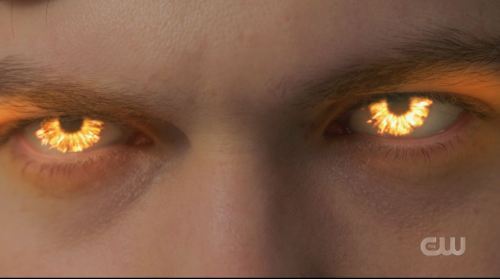
“One becomes two, two becomes three, and out of the third comes the one as the fourth.” (the alchemist Maria Prophetissima 1-3 C AD). This refers to the four stages of alchemy, the refining of base metals into gold on the material plane, but the refining of the soul to God on the spiritual plane - nigredo (black), albedo (white), citrinalis (yellow), and rubedo (red).
In Jung’s interpretation of this alchemical piece of wisdom, this means the refining of the psyche:
1) = Conscious Self
2) = Unconscious Self (the Shadow or Mirror)
3) = Inner Mediator
4) Integrated Self

(One of the books Dean uses to build the Ma’lak box in 14x11 Damaged Goods)
This meta is concerned with Jack’s rich symbolic role in the SPN narrative.
Jack enters the story to help Team Free Will face their Shadow-Selves and thus evolve psychologically.
This concludes my S14 meta series on the Jungian (and alchemical) themes of the season.
You can read all the previous meta in that series here:
1) The Shadow 14x08
http://drsilverfish.tumblr.com/post/180906003584/the-shadow-14x08
2) 14x09 The Spear (Jungian Decoder Ring Edition)
http://drsilverfish.tumblr.com/post/181122764984/14x09-the-spear-jungian-decoder-ring-edition
3) Jung and Dean’s Journey Towards Self-Integration in 14x11 Damaged Goods
http://drsilverfish.tumblr.com/post/182299438269/jung-and-deans-journey-towards-self-integration
4) Ouroboros in Prophet and Loss (14x12)
http://drsilverfish.tumblr.com/post/182486474324/ouroboros-in-prophet-and-loss-14x12
5) A Pearl of Great Price - 14x13 Lebanon
http://drsilverfish.tumblr.com/post/182660472289/a-pearl-of-great-price-14x13-lebanon
6) The Serpent and the Egg: Snake and Eye Symbology in 14x14 Ouroboros
http://drsilverfish.tumblr.com/post/183327000184/the-serpent-and-the-egg-snake-and-eye-symbology
7) Another Alchemical Easter Egg in 14x14
http://drsilverfish.tumblr.com/post/183388134889/another-alchemical-easter-egg-in-14x14
8) The Scapegoat: Speculative Musings on S14′s End (Moriah) (Linked to the Season’s Jungian Themes - Scapegoating and the Unacknowledged Shadow)
http://drsilverfish.tumblr.com/post/184045009309/the-scapegoat-speculative-musings-on-s14s-end
9) Dean’s Jungian Shadow Arc in S14: Confronting the Internal Father (2x22 to 14x20 Moriah)
https://drsilverfish.tumblr.com/post/184507150574/deans-jungian-shadow-arc-in-s14-confronting-the
Jack is dualistic; Good and Evil, Human Soul and Angelic Grace. He is a trinity: Human, Angel and “Demon” (fallen Angel); Dean-mirror, Cas-mirror, Sam-mirror. He is also a quaternity, thanks to the additional feminine element: his mother, Kelly Kline and his adoptive mother/ grandmother Mary Winchester (the latter resurrected by the feminine God-principle Amara).
Jung considers the quaternity to be highly significant (he refers to “squaring the circle”) including, as above, in relation to his interpretation of Maria Prophetissima’s alchemical summary as being analogous to the stages of psychic growth and integration. He often considers the, Son, Father, Holy Ghost and Mother Mary of Christianity to be external symbols for the four stages or elements of the human psyche.
“The quaternity, is an archetype of almost universal occurrence [. . .]” For instance, if you want to describe the horizon as a whole, you name the four quarters of heaven…There are always four elements, four prime qualities, four colours, four castes, four ways of spiritual development, etc. So, too, there are four aspects of psychological orientation [. . .] The ideal of completeness is the circle sphere, but its natural minimal division is a quaternity”
(Jung: Psychology and Religion: West and East).
Conceived by stealth-rape in a Bucklemming episode (12x08 LOTUS) Jack was possibly off to an inauspicious start as the Devil’s Baby.
But Jack the Nephilim, son of Lucifer and Kelly Kline, had the good sense to adopt Castiel as his protector in the womb, and from then on out he has ascended through the spiral narrative like the phoenix he is.
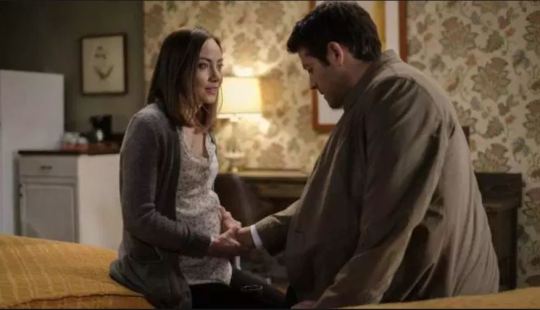
Born in 12x23 All Along the Watchtower, Jack was always part of Dabb’s Ouroboros narrative. A "demon” with yellow eyes in a nursery, a child, and a mother who dies; Jack was a mirror, reflecting SPN’s origin story, of Azazel feeding baby-Sam demon blood, and burning Mary Winchester on the ceiling. And Jack was Sammy and Azazel both.
Castiel died at Jack’s birth too, murdered by Lucifer in front of Dean’s horrified eyes, thus placing Cas in the role of Mary Winchester and Dean in the role of John Winchester.

Adopted by a reluctant grieving Dean and a hopeful Sam, Jack discovered he loved nougat and stole a lot of fandom hearts.
Importantly, through their adoption of Jack and his reflection of many of their previous experiences, TFW are forced to recognise themselves (including painful repressed elements of themselves) in him, thus he enables them to better meet their Shadow-selves and evolve. In this sense he is the mediator between the Ego and the Id, the conscious self and the unconscious self, the Self and the Shadow for TFW. That is why Jack is linked to the symbol of the Ouroboros, the snake swallowing its own tail, because in alchemy that signifies transformation:
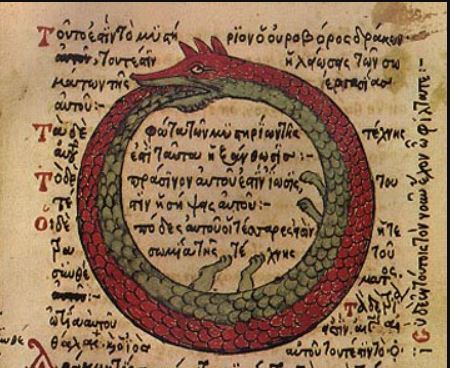
This self-recognition (of themselves in Jack) is initially much easier for Sam and Cas than it is for Dean....
Sam the boy corrupted by demon blood, of course sees himself in the innocent yet unstable son of Lucifer. Cas, fallen angel in love with humanity, likewise naturally sees himself in a half-angel/ half-human child who is struggling with his place in the world.
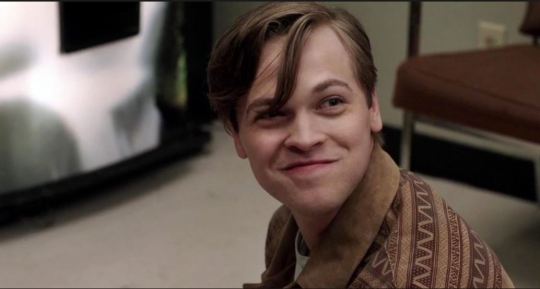
Juxtaposing innocence and enormous power (potential for good and potential for evil) Jack was a child who grew up too fast, literally (appearing twenty whilst only two). In this respect, he was a mirror for Dean, who had to grow up too fast when his Mom died, assuming the role of substitute-parent to Sammy.
Dean has a hard time recognising and having compassion for the innocent child part of himself that he gave up to become Daddy’s “good little soldier” and caretaker to Sammy. Which is why his journey into loving Jack (as a reflection of himself) goes hardest (see my meta on Dean’s Jungian shadow arc, linked above, for more on this).
Jack is also (like Dawn in Buffy) a metaphysical, mystical key. He opens doors; doors between dimensions/ worlds and alternate universes as well as doors in the psyche between the Self and the Shadow. He is the key to Chuck’s multiverse and to the larger God-machine.
Jack (responding to Dean’s intense grief) resurrected Castiel in The Empty, the space where dead angels and demons go. Only Chuck had resurrected Castiel previously. So, we see Jack step into the role of God, but in a place (The Empty) where (if we believe the Cosmic Entity that resides there) God has no dominion. Jack already presages God Level Mark II.
With Mary Winchester in the apocalypse world (she who was resurrected by the feminine God-principle, Amara) Jack stood on the side of humans against angels, and in this, he was a mirror for Castiel (who rebelled against Heaven to stand with the Winchesters).

When his birth father, Lucifer, stole his grace in 13x23 Let the Good Times Roll, Jack became de-powered (human-ish) again, mirroring Castiel (and his Human!Cas arc after the angel fall in 8x23 Sacrifice).
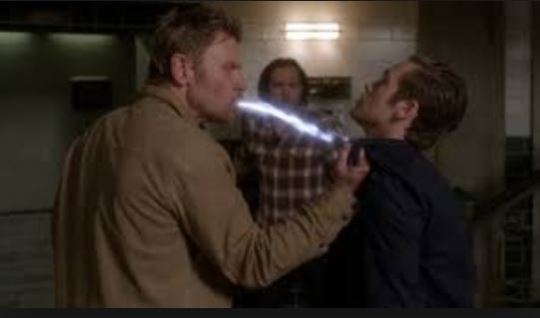
With his soul/ grace unbalanced, Jack began coughing up blood; a mirror for Sam’s journey during the demon trials of S8.
Knowing he was dying, Jack went fishing with Dean in 14x07 Unhuman Nature
Ahhh all the lovely fish and fishing metaphors SPN has employed over the years. Fish have sometimes stood for humans, sometimes stood for angels, but always for angel/ human convergence. Jung in Aion (reading medieval alchemical texts) writes about the fish as an alchemical symbol for the philosopher’s stone (the mystical substance that allows transformation - of matter and spirit and, for Jung, of the psyche): “...alchemical fish symbolism leads direct to the lapis, the salvator, servator, and deus terrenus; that is, psychologically, to the self.” (Jung, Aion: Researches into the Phenomenology of the Self, 1979: p157)
So, Dean and his adopted Nephilim son fish together, which recalls, in particular, Dean’s fishing dream in 4x20 The Rapture, which Cas entered and there passed Dean a love note of assistance. If fish are angels, then Dean and Jack have already “caught” one, by means of love: Castiel.
Dean is placed here again in the role of his own father, John Winchester.
JACK: “You once told me you and your father did the exact same thing. It was your happiest memory of him.”
And Jack, as the product of angel/ human congress, has always stood (in subtext) as a metaphor for the love between Dean and Cas.
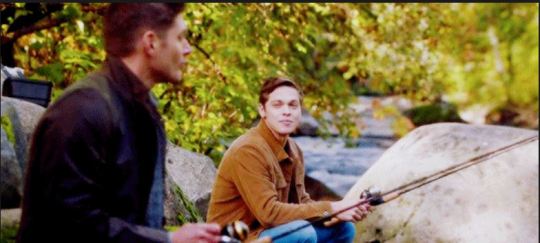
But, metaphysically unbalanced, Jack sickens further. An injection of Gabriel’s archangel grace doesn’t help. TFW take him to the hospital together, to no avail. Sam, his third adoptive father, keeps vigil at his bedside as he dies.
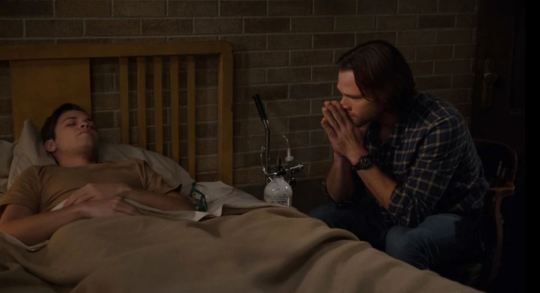
Jack finds himself in Heaven. Here he is a mirror for Sam and Dean, who have both died multiple times on the show. He reunites with his mother Kelly Kline, but The Shadow (a manifestation of The Empty particularly linked to Castiel, symbolising, as it does, Cas’ Jungian Shadow-self) has invaded Heaven and wants to drag Jack to The Empty with it. Jack’s duality is here highlighted, as his human soul belongs in Heaven, but his dead angelic self belongs in The Empty, (according to the SPN cosmic sorting hat!)

Castiel comes searching for Jack in Heaven, and makes a deal with The Shadow in 14x08 Byzantium - Jack’s life for his own (the moment Cas allows himself to be happy). Cas and Jack mirror Dean and Sam here, and all the supernatural deals they’ve made, or tried to make, to bring one another back from death over the years. Cas in particular mirrors Dean, because Sam has always, in one sense, been not only Dean’s brother, but his son.
As ever, there will be a price to pay for this deal. Not only Castiel’s promise to surrender himself to the Shadow, but also the second “death” of Mary Winchester (caused by a resurrected Jack).
But, Cas loves his Nephilim son so much (<my heart>):
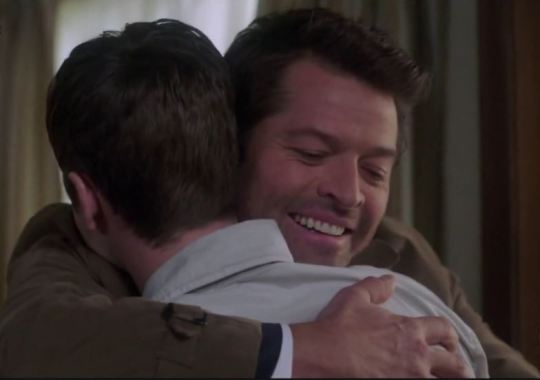
Held in an unstable balance thanks to Lily Sunder’s dark soul-consuming magic, things start to get dicey for Jack post-resurrection. He tries to impress Max, Stacy and Eliot (the Lebanon kids) and ends up stabbing Stacy (Castiel’s mirror) with an angel blade (14x16 Don’t Go in the Woods) leaving Max (Dean’s mirror) grieving over her body, thus, in that moment, mirroring his father Lucifer (12x23 All Along the Watchtower), However, he brings Stacy back from death (mirroring his own resurrection of Cas) but every time he uses his powers, he burns off some of his soul:
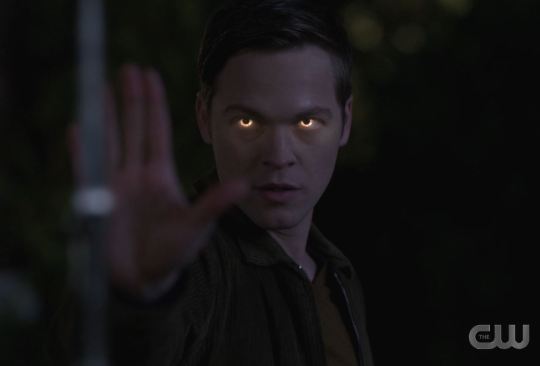
Wow he is cycling, Ouroboros style, through so many previous TFW arcs.
And so we arrive at 14x14 Ouroboros itself, THE crucial episode in terms of all this symbology, in which Jack kills the Queer Gorgon Noah Ophis (himself an Ouroboros symbol = Noah from Genesis and Ophis from Revelation) to save the Winchesters and adopts his snake, Felix (also an Ouroboros symbol).
Then, he burns off considerably more of his soul (perhaps all of it - it’s unclear) to kill AU!Michael, and swallows his grace, Ouroboros style:

Jack is now another symbolic duality and trinity - he contains elements of both Michael and Lucifer, the two opposing forces in Apocalypse Mark I, now united in one being. The third element is provided by his humanity (now, seemingly, in jeopardy).
An evolved and fully re-powered-up Jack has sprung forth, just as Pegasus the winged horse and his brother Chrysaor of the golden sword did from the neck of their Gorgon mother Medusa when Perseus slew her:

In this form, Jack is linked (via a book on Donatello’s shelves behind him in 14x15 Peace of Mind - thanks to @postmodernmulticoloredcloak for this spot!) to the Caduceus symbol on the spine of the Book of Life here:
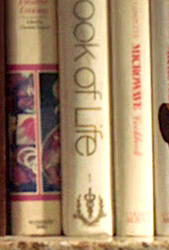

The Caduceus is the staff of Hermes, consisting of two serpents entwined about a staff crowned with wings. Hermes is the messenger of the Gods in Greek mythology. He can move freely between the worlds of God and men (linking to Jack’s function as a metaphysical key, on both a micro-cosmic psychological scale, and a macrocosmic God-machine scale). Hermes was also a psychopomp, a conductor of souls to the afterlife. The psychopomp is linked by Jung to the psychological mediator function - that which mediates between the Self and the Shadow, as Jack does for TFW via his mirroring function.
Jack’s visit to Donatello also serves to remind us that even someone without a human soul can live a good life if they pick the right role models (Donatello picks Mr. Rogers, Jack picks the Winchesters).
In 14x15 Peace of Mind, Jack demonstrates both his potential for good and evil in this new diminished soul-state, via a (misplaced) compassion (good) which leads him to kill Felix the snake (evil) believing the beastie is grieving for Noah the Queer Gorgon and will be reunited with him in death:
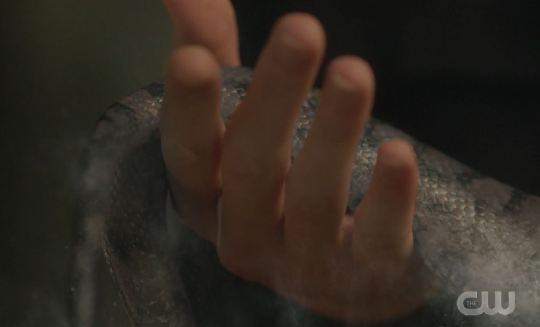
This death of the snake is also symbolic of Jack’s role as mirror and mystical key - old patterns within both Team Free Will and Chuck’s Multiverse must die, in order for newer and healthier ones to be born. Jack is the catalyst, the messenger, the Ouroboros, the Caduceus.
In Jack’s new, vulnerable, state (with either some, or all, of his soul gone) he banishes Lucifer back to the Empty in 14x17 Game Night after Nick (bleugh) tries to resurrect him, and he then burns Nick to a crispy cinder for good measure. Afterwards, Jack is tormented by Hallucifer (a vision of his father Lucifer in his mind). This is very possibly the actual Lucifer, communicating with Jack via the blood-link spell Nick performed, hoping to lead him astray. It certainly sounds like the actual Lucifer. It also, of course, mirrors Sam’s Hallucifer arc.
Distressed by Mary’s reaction to his incineration of Nick and taunted by Hallucifer, Jack loses control and (or so we are led to believe) kills Mary (in fact I think he’s blasted her unwittingly through a portal to an AU/ mirror universe, but that’s another story).
Now the crisis in Jack’s relationship with his adoptive fathers is set up.
Dean, is the member of TFW who (as I explained above) has found it hardest to have compassion for the mirror-self whom Jack reflects back to him (young Dean with the weight of the world on his shoulders) and he determines Jack must be locked in the Ma’lak box and/ or killed. Sam and Cas, who have been better able to recognise themselves in Jack and so have compassion for him, dissent (but Sam’s hangover child-role to Dean’s father-role in their toxic co-dependency means he doesn’t initially stand up to Dean).
Here is Jack, locked in the Ma’lak box (Jack in the Box 14x19) being tormented again by Hallucifer:

And, of course, that couldn’t contain him, so, deeply upset at being lied to by two of his three adoptive fathers, Jack busts out all glowy-eyed:

Chuck shows up to set Mount Moriah and Abraham and Isaac redux in motion , and Dean, possessed by his Shadow-self (the Ghost of John Winchester) gets ready to repeat history.
A yellow-eyed “demon”has killed Mary Winchester (again) and Dean-as-John picks up Chuck’s weapon of RevengeTM (the Hammurabi - see my meta on Dean and his Shadow arc linked above for more on this).
But Jack, in his role as mirror and mediator between the Self and the Shadow. freely offers himself as a sacrifice, a scapegoat.
And seeing this, at last, Dean has compassion, both for Jack and for his own mirror-child self, “murdered” by John Winchester’s revenge quest to get Yellow-Eyes/ Azazel. And so, he stays his hand.

Chuck, the bastard, kills Jack anyway and lights the fuse under Apocalypse III.
But, because Jack is a metaphysical key and the symbol of transfomation (Ouroboros) he can move between all the realms of the God-machine. And so, Death has no true dominion, and we see Jack awaken (14x20 Moriah) in The Empty:

There, he is greeted by a figure, presumbly the Cosmic Entity who presides over the place, as well as by Billie the New Death.
According to the Empty’s Cosmic Entity in 13x04 The Big Empty, “Before God and Amara, creation, destruction, Heaven, Hell, your precious little earth, what was there?... Nothing. Nothing but Empty... Angels and demons... you all come here when you die... I’m the only one that has any pull here. Not Heaven, not Hell, not G-O-D himself.“
As with the Amara storyline (she is mapped to Sophia, the cosmic feminine God-principle) it seems Dabb is drawing on Gnosticism in his conception of The Empty. Jung was also fascinated by Gnosticism.
The Gnostics made a distinction between the supreme unknowable Being, and the creator of the material universe, God, known as the Demiurge (who was often seen as amoral, even wicked).
We don’t yet know whether Chuck has already merged with Amara, and is the double entity Chuck/ Amara or, whether her feminine God-principle will be instrumental in persuading him to finally end his story, and let Team Free Will and humanity become the authors of their own stories. The latter would make sense in Jung’s quaternity structure, and would be linked to my theory that Mary Winchester is not dead and will return to her sons before the end.
Chuck, as the Demiurge, may perhaps be the mere avatar or emanation of the true supreme Godhood, if we take a Gnostic perspective. Whilst Chuck-the-Demiurge must be defeated, because he doesn’t want to relinquish control of the narrative, in his Supreme Godhood form, and/or merged Amara form, he may himself relinquish control and let Team Free Will go.
Whether Jack is initially manipulated by The Empty, Death and/ or an awakened Lucifer and/or indeed AU!Michael, or joins forces with them (in their good faith) remains to be seen. Lucifer may (ugh, but definitely possible) get a redemption arc, as he has, despite his many evil deeds, undoubtedly been wronged by Chuck (forced to bear the Mark of Cain and thus become corrupted by it).
Ultimately, I have no doubt that Jack, thanks to his loving connection to Team Free Will, will ultimately (as Cas has always believed) be “good for the world”:

(Jack and his three adoptive Dads in Unhuman Nature 14x07)
Jack, as the alchemical symbol of transformation (Ouroboros) as Mercury the mediator (Caduceus) between universes, between realms in the God-Machine, and between the conscious and the unconscious, and as the union of opposites (Michael and Lucifer, Good and Evil, Self and the Shadow), and as the trinity symbolising that unity (Sam, Dean and Cas merged as TFW) and as the quaternity (the ultimate integration [I hope] with the feminine principle symbolised by Mary and Amara) will, I believe, help usher in “Paradise” after the Apocalypse III; a “new Heaven and a new Earth, because the old Heaven and the old Earth had passed away” (Revelation) in which true free will reigns and Team Free Will have completed their psychic journeys.
“Thus we have the “hostile brothers,” Christ and the devil, who were regarded as brothers in the Jewish-Christian tradition; the tetrameria into four parts or elements; the paired opposites and their ultimate unity; the parallel of the lapis and Mercurius with Christ and, because of the snake or dragon symbolism, also with the devil; and finally, the figure of Mercurius duplex and of the lapis, which unites the opposites indivisibly in itself.”
(Jung, Aion: Researches into the Phenomenology of the Self, 1979: p214)
https://www.jungiananalysts.org.uk/wp-content/uploads/2018/07/C.-G.-Jung-Collected-Works-Volume-9ii_-AION_-Researches-into-the-Phenomenology-of-the-Self.pdf
#Supernatural#SPN meta#Meta#14x20#Moriah#Jung in S14#Jack Kline Novak Winchester#Jack the Nephilim#Ouroboros narrative#Alchemy in S14
100 notes
·
View notes
Video
youtube
LIZZO - GOOD AS HELL
[7.55]
We look forward to "Juice" hitting the top 40 sometime in 2021..
Katie Gill: It is infinitely amusing that with Lizzo's career trajectory, her songs that are 2-3 years old are getting the radio play instead of her current work. Granted, "Good As Hell" is an absolute banger. But it's an absolute banger that is obviously a product of Lizzo's earlier work, especially when compared the the musical evolution she shows on Cuz I Love You. It's also an absolute banger that seems tailor-made for inclusion in movie trailers or makeover montages but hey, get that bread Lizzo. [7]
Wayne Weizhen Zhang: Lizzo singles don't expire after three years; they're just like chardonnay, get better over time. [8]
Thomas Inskeep: Goddamn, Lizzo can wring every bit of strength out of a female empowerment lyric, can't she? And she nails the rapping/singing combo like no one since -- I dunno, Lauryn Hill? In fact, maybe she's the rightful heir to L-Boogie's throne? And she does it all so damn joyfully to boot. Talk about fresh air on the radio. [8]
Joshua Copperman: After enjoying Big GRRL Small World, I remember hearing that Lizzo signed to Atlantic, working with the insufferably goofy producer Ricky Reed. It felt like a classic "sell-out" moment even if the term has lost all meaning. This song felt destined to blow up, but went nowhere. Neither did "Phone," and neither did "Truth Hurts." Cuz I Love You could incorporate her earlier, more political work in ways that felt authentic... but then "Truth Hurts" got massive, and "Good As Hell" is well on its way. There's a sense that Lizzo will go further in the shouting party anthem direction. She's a great interview, and a fantastic live performer, but it's disappointing to foresee a Bruno Mars-style trajectory when there's so much more to offer. At this rate, Big GRRL Small World could see a rerelease as the darker, more ambitious follow up, but she's still clearly happier making mindless party music. If she saves the thoughtful political commentary for when Terry Gross calls her "brave", that's okay. [6]
Stephen Eisermann: It is so hard to fault Lizzo's older material. While it's very easy to be cynical about self-empowerment anthems today, Lizzo has consistently shown that she excels at putting herself, a plus-size black woman, first and showing other people how to put themselves first. It's hard to separate her past hits from whatever current story she is involved in (like that horrid Postmates debacle), but, fuck, you are full lying if you say you don't smile on even your worst day when you play this chorus. The background vocals, the energy, the personality -- no part doesn't hold up. There is no chorus like a Lizzo chorus, no matter how long it has taken people to notice. [8]
Alfred Soto: Lizzo released a terrific album this year, you know, on which her sense of rhythm and how a star in waiting presents her material meshes wit the body-positivity messages. [6]
Tobi Tella: Sometimes the strength of a song is enough to push past any factors trying to stop it from entering the public conciousness. "Good As Hell" is a little corny, sure, but it's also empowerment without pandering, an uplifting song that doesn't feel the need to insert generic platitudes. Most of all, it's fun, which is something I think 2019 music totally misses most of the time. [8]
Kayla Beardslee: Personally, I'm looking forward to a couple singles from now, when Lizzo's team will be looking so far in the past for singles to push that they'll arrive at a point before her music career began and encounter a time paradox. If "Truth Hurts" can go #1 two years after its release, anything is possible, and why can't that include Lizzo deconstructing our understanding of time as a linear concept? Oh, and I'm supposed to review the song, too. Yeah, "Good As Hell" bops, will bop, has bopped, bops in the subjunctive, etc. The vocals are fantastic, and the piano riff gives the song a constant feeling of forward motion. It's the kind of track that makes you want to sing along, and even if (like me) you fail at imitating Lizzo's attention-grabbing vibrato, "Good As Hell" is so relentlessly fun that you'll feel happy about it anyways. [8]
Kylo Nocom: The power of hindsight is very strange. I used to see talk go around about how "Good as Hell" sounded like it could have been a hit, and now that it is one, is that underdog appeal still here? I used to think that her being compared to Natasha Bedingfield in Pitchfork's review of Cuz I Love You was unfair, but in hindsight, it's not really that far off. Values PSAs had "Where Is the Love?" then, and the soundtrack to them would be "Good as Hell" now. That's not a condemnation: corny stays in fashion, and with sounds as lovely as the ones Lizzo selects (namely, the drum kit of the chorus and the sampled vocal belts) it's easy to ignore how ultimately juvenile the message feels. [8]
Jackie Powell: Right now as we speak, "Good as Hell" sits at number 30 on the Billboard Hot 100. It was featured in the third film in the cult series "Barbershop," which starred fellow women in hip-hop Eve and Nicki Minaj, both whom Lizzo currently eclipses in relevance. Like the film, this track came out three years ago. This sleeper hit, along with Lizzo's career, has emerged from the ashes. They are a collective rising like a phoenix but with slightly more swagger and chock-full of sass. How is all of this possible? Lizzo's entire being defines what it means to be living in 2019. Self-care, inner strength, and an IDGAF attitude. That's why "Good as Hell" hit harder in 2019 rather than three years earlier. Zane Lowe has referred to this track as an "instant vintage vibe" and that's due to clean but predictable production from Ricky Reed. Lizzo's delivery functions in between a bounce in the verses and sweeping call and response in the pre-chorus and the hook. Her magic remains in the way she works to make her raps more digestible for listeners who live on the throwback playlists on Spotify. She's creating a similar product to Mark Ronson in that they both aim to bring sounds from then and now together in a triumphant union. Thank goodness for Lizzo, someone who has the secret recipe to make anyone feel "as good as hell," a task far from effortless. [7]
Vikram Joseph: It seems kind of fitting that I'm writing this before work on a wet Monday morning, because "Good As Hell" is transformative in a way that's hard to resist. Taylor Swift might have recently claimed that she "want[s] your dreary Mondays" (ok, not yours, Joe Alwyn's), but "Good As Hell" simply will not allow them to exist -- at least for 2 minutes and 37 seconds. It achieves this mostly because of the melancholy that lurks in the corners of the song, and because of the way that classic descending chord progression confers a sense of unconditional positivity in the face of chronic adversity. The delivery of "baby, how you feeling?" should win awards -- most singers would sell it as uncomplicated celebration, but Lizzo sounds incredibly empathetic, concerned even, like she half-expects the answer might be "like shit, Lizzo, I feel like shit." And the song's instant meme -- "hair toss, check my nails!" -- is actually a performance piece in putting your best self out there when your heart feels bruised and tired. The strange, wonderful alchemy of "Good As Hell" is that, through method-acting feeling good as hell when all of your instincts tell you that you really don't, it actually makes you feel fucking incredible. [9]
[Read, comment and vote on The Singles Jukebox]
3 notes
·
View notes
Text
Chaos Critic’s Top 10 Disliked Anime
Oh man I am going to get SO much flack for this one . . . I know, I know" so many anime are out there, and so many are like this, and yadda yadda - Look, I wanna do this, I wanna help people steer clear of these shows, and if someone likes these shows, more power to ya, but I don't like them, this is only opinion, and I prefer that no one calls me a liar or a jerk for saying something about an anime that is all speculation and varied per person. Anyways, I don't own these animes, and please read and enjoy, no flames, thanks a bunch. Let me say this now: not all anime rock. I have been an avid anime watcher since I was in the 5th grade, and when I realized anime were released every year, in the hundreds, I was flipping over in cartwheels. Vampires, dragons, wizards, ninjas, rock and roll - all of those in my favorite animation style that is pretty much SO flipping awesome in so many ways - made me so happy. I ended up binging anime on Toonami, (still do), and joined several anime sites to get the latest anime dishes and series that I could muster up enough free time to watch. My parents grew concerned about me watching so much of it to the point where I would have been addicted, but then I ended up telling them it was where my heart laid, and they accepted, it with somewhat unwilling protectiveness. After all these years of watching anime and reading manga, I ended up developing tastes that ranged from very horroreqsue anime with suspense and mystery to ridiculous comedy with great puns on words. 'Bakemonogatari', everyone.
However, with these tastes and genres came some of the weird and strangest animes I have ever seen, and am currently watching. Does this mean I think all 'weird' anime are bad? Heck no - 'Bobobo-Bobobobo', "Panty and Stocking with Garterbelt" and "FLCL" are some of my favorites, although I consider Bobobo a guilty pleasure. I did run into some strange and bad anime, however, and it made me wonder whether or not getting into anime at all was a good or bad idea. It even made me think that these were the animes that gave other great ones bad wraps - hence the stereotype of Japanese anime always being about ten-year-old girls and tentacles. No idea why, honestly. The more I do think about it, however, I do feel there are some pretty bad anime out there on the internet, and if you ask any anime fan, they will list some anime that are bad, their favorites, and even one they watch when they choose to. Many a conversation I had often resulted in me talking about the ones I liked more than the ones I hated, to my relief. But otherwise, I feel these anime I'm about to list carry their ideas a bit too far, go too far with anime as a format, or are just overhyped and bad as heck . . . just because an anime is weird, strange, badly dubbed or whatever else does not mean I have to hate it. I have my reasons. So, without fault, here's my top ten anime I dislike more than others. Keep in mind that these are the anime I dislike for certain reasons, and if someone out there does like these, and calls me out for hating them, then I accept it. Just because I hate something doesn't mean you can make me like it.
And here they are. NUMBER 10: " Lil' Pri" I thought this series would be cute to watch for a while, and I decided to watch a few episodes. I ended up binging the whole series and started thinking too much about it. Then I realized it wasn't really that good. Ringo Yukimori, a young girl who enjoys Snow White's stories, literally bumps into two other girls at a concert for a super famous singer named Wish. The other girls, Leila Takashiro and Natsuki Sasahara, also enjoy the stories of Princess Kaguya and Cinderella. The suddenly then run into three adorable talking animals, Sei, Dai and Ryoku, (a bird, a squirrel and a dragon), who are looking for their princesses in the human world. The main idea behind this series is that the three girls turn into older versions of themselves with the embedded spirits of Snow White, Cinderella, and Princess Kaguya to help bring human happiness, "happiness tones", to Fairyland and save it. Humans' happiness and believe in the fairytales has dwindled, decreasing the happiness tones. So, the girls agree to help retrieve those, and along the way, they figure out Wish is the Queen's 'long-lost' son, who can turn into a rabbit . . . Yeah see where I'm going here? The anime is, for all intents and purposes, as straightforward as a magical girl series can get. There are no hidden meanings to Ringo, Leila or Natsuki, and their names pretty much are dead giveaways to what stories they enjoy most. Prince Chris, a.k.a. Wish, is immediately given focus at the beginning of the series, and there are no real surprises until the last few episodes of the series when the girls give up their magic, hint-hint, and leave Fairyland after retrieving all the happiness tones. Let me tell you, that can get kind of boring . . . The main problem I have with this series overall is how bland it is and how it seems to take ideas from several other little girls' magical shows, such as Ojamajo Do-re-mi or Pretty Cure. The concepts of having normal girls become heroes to save other lands, rescue royalty and adapt to their situation are something I've heard before and seen more excellently done, in other shows. The fact the girls also become idols onstage is an interesting quirk, but it reminds me too much of the Witchlings' maid outfit changes from the fourth season of Ojamajo.
It doesn’t help the CGI in the anime comes off as awkward, leaving the concert scenes clunky and hard to watch. Their movements are stiff, and their voices are not exactly the best. They do get better in vocals as the series progresses, but everything else stays the same. When I also state how bland the series is, I'm also referring to Ringo, Leila, and Natsuki, reluctantly. The audience is told and can understand the heroines well enough to the point where we wish they had more depth. They all love Wish, they love fairytales, Ringo loves apples and has seven brothers, Leila is half Italian, Natsuki loves sports - we get it. The problem is that they have no other depth than being cardboard cutouts of anime heroines. We are never given any character conflicts, they never have issues that expand over the series, they never really get the kind of development other series like Sailor Moon receive for magical girl heroines. I know I may get flack for mentioning that, but I have seen development of Usagi Tsukino in both the manga and the new anime adaption of the series. The girls don't really receive any development here, aside from the minor mentioning of growing up and accepting happiness as it comes rather than forcing it on others. The reason this one ranks so low on my list is because I do still enjoy the cuter designs of the characters, and give it points for trying to come up with a good driving plot that does bring to mind the idea of growing up and being happy. It’s a cookie cutter style idol show but it has heart to it. It tries to overstep its bounds, but never gets the chance to. At the same time, I also think Show By Rock!! and Zombieland Saga did the “idol concept with a twist” take much better, what with one being a Sanrio based product that combines an isekai with an idol show, and an idol show about zombie girls that satirizes the entire idol industry. NUMBER 9: " Full Metal Alchemist" I am going to get SO much flack for this one . . . Before someone eats my liver, let me say I love the series as a whole, but compared to Brotherhood, this series has become something that both baffles me and makes me confused. The series revolves around Edward and Alphonse Elric, who try to bring their mother back from the dead using the practice of alchemy. Strictly taboo, and stricken with grief, they decide to bring her back and return to their happiness. However, something goes horribly wrong and Alphonse's body is taken as compensation for their mother, who doesn't truly return. Ed sacrifices his arm and leg to save his brother and bring him back in a suit of armor. After the incident, in the anime, Ed decides to join the military of Risembool and hunt down the Philosopher's Stone, which is implied heavily to be something that can work real miracles. I enjoyed watching the series, and I empathized with both Edward and Alphonse. They lost everything, tried to get it back, and lost more in return. Their tackling of the philosophy of equivalent exchange and getting something for nothing is truly moving, and the deep symbolization of The Philosopher's Stone being hope and realization is something that I know I will never see duplication of. Then . . . I saw the ending episodes of the first series. And I got mad. I expected an epic climax, much like what happened in "Full Metal Alchemist: Brotherhood". I wanted Ed to get his limbs back, Al to get his body back, Ed to marry Winrey, Hoenheim to die and accept his flaws, for the Philosopher stone to dissolve, and for Scar to repent himself . . . Instead, we got something that felt rushed, confusing and strange to me. Something that throws the entire series out of whack because of it. The leader of the Homunculi, who had been chasing Ed and Al all over the place until they reached Liore again, were being led by Dante. The old lady who taught Izumi, their teacher. The old lady who was killed by Greed in episode 33. Who had an assistant who had that strange alchemic tablet. Dante, as it turns out, was a lover of Hoenheim, much to everyone's shock, and when Hoenheim and she gave up their souls for the stone, they created something that they could use to swap their bodies and minds, intelligence included, into other beings, sort of like the plot of "Quantum Leap" without the randomness and depth. She was jilted because Hoenheim left her, (reasonably succumbing to his guilt over killing so many people to make the stone), and she decided to make and use the Homunculi to chase down HIS sons and make a new stone. In other words, she ended up wanting to make another stone, and her real motives for why are never explained, although her anger over Hoenheim leaving her for another woman, then using HIS KIDS to make a new stone, is petty in terms of evil levels. She toyed with the Elrics, taunted them throughout the series, and ended up controlling things to make a new Philosopher's stone. That part, however, is hard for me to buy. Dante being the villain behind everything, including the making of the second Philosopher's stone, and bringing back Rose for no other reason than to use her as a 'figurehead' then possess her, is hard for me to take in. This would mean she'd have to have tabs on the Elrics at all times, be involved in the Risembool military, use more than one person at one point or another, display that she knew about the war and probably was the one who started it in the first place. There were no indications to me that Dante was the villain all along through the series, as the Homunculi were given more screen time than her, her assistant and later body double Lyra was shown twice and was bland as other minor characters, and things don't connect well for me to buy it logically. If she was the one behind everything, and she was supposed to have been fake-killed by Greed, then when did she successfully possess Lyra? How long has she kept tabs on the Elrics? Was she involved somehow in Trisha's illness, that kickstarted the entire flipping hunt for the Philosopher's Stone? If she was also involved, why drag Rose into the battle to just tick off Edward? And furthermore, if Hoenheim knew if she was behind everything, and knew he'd be killed otherwise, then why didn't he just come right out and explain everything to the brothers when they first got involved with the Homunculi? Was he just afraid of dying? Of killing others?
The more confusing thing is how this ending was created. Anime depends on the manga in most cases to flesh out the story. If the manga is over several volumes, like One Piece or Bleach, episodes will be released and designated in arcs and storylines. If the manga is ahead of the anime, then the writing process for the episodes can be ad-libbed thanks to the story that’s already present.
When the manga halts or goes on hiatus, the anime must do something to fill in the extra space while the mangaka continues their work. Hence “filler arcs”. Like the extra few filler arcs in Bleach that involve the new captain or the Bounts, or the filler arcs in Naruto that everyone wishes didn’t exist. They exist to not only extend the anime’s lifespan but to try and flesh out the worlds of these series to make them feel more alive.
In this case, this was a filler ending for the Full Metal Alchemist anime series. The manga had gone on hiatus and they had nothing to conclude the show with, so they had to deal with what they had. I wanted to like it, but after looking at everything, I just find that nothing fits. Either way, the ending of the original anime just befuddled me with an antagonist who was barely connected to the story to me, and the threads that bound her fingers to her puppets were about as thin as fishing line to me. . . . Not to mention I'm still wondering how the anime connected itself to the 'parallel-world' of 'Germany' and how Edward was stuck there through the movie "Conqueror of Shamballa", but that movie did try to tie up the original anime series with a bow.
Of course, this leads me to say why I dislike it so much: because Full Metal Alchemist: Brotherhood exists. It’s an amendment to the series that aims to follow every detail of the manga. We see more progressive action and character development from start to finish, and we see an expansive world that was never given to us in the original anime. Fans of the show were rewarded with Ed and Al getting what they wished for, intense and awesome animation, and a marriage proposal that is adorable no matter which way you put it.
However, I will say the first 10 to 13 episodes of the original anime are far better introductory episodes than the first few episodes of Full Metal Alchemist: Brotherhood. We see the Elrics grow and reach their respective early goals quick, and we actually get to know Alexander and Nina before Shou Tucker fucks things up. We also get deeper motivation for Ed’s reasons to become a State Alchemist.
If I did have to recommend this series to people who’d never seen it, I’d say go watch the first 10 episodes of the first FMA series, then watch Brotherhood in its entirety. Get the context and emotional development first, then come back in for what else is in store. And now I'm gonna put on this football helmet while I wait for the hate mail. NUMBER 8: " Ghost Hound" This one is a special case of bad to me. There was a point where I got hooked on the anime "Serial Experiments Lain" and I got into the idea that many anime were deeper than they seemed. Lain was a dimensional protagonist who I felt much in common with, and developed a sense of what I wanted to know about ESP. I decided to get into shows involving the subject, and later developed a taste in supernatural shows and law dramas. Or anything that often touted lighter themes of horror. I found this anime on accident one day when I was looking up scary anime. And after finding out it was done by Production I.G. and Shirow Masamune, I was ecstatic. I was disappointed when I watched it. The entire story revolves around a boy named Taro, who was kidnapped with his younger sister Mizuka on September 22nd, 1996. His sister died, but he survived the horrific situation. Since then, he's been seeing a therapist and has horrible PTSD-induced nightmares involving the situation. He also develops the ability to astral project himself into The Unseen World, which is the space between the living and the dead, and he uses his ability to better himself and his friends Makoto and Masayuki, who have also suffered similar traumatic childhood situations. They are led on this journey by their psychologist, who has his own agenda on the matter, but wants to help solve the supernatural insanity in the boys’ lives due to his own interactions with The Unseen World. On its own, this idea is rather interesting, and you feel it can be done well over the course of 13 episodes, with an added OVA of how the entire conflict is resolved with death being a part of life, how having a power means it comes with greater responsibility and how everyone has issues they must come to terms with. And in the case of Masamune’s anime, delve deeper into the human understanding and structure of the conscious and unconscious mind. However, the anime takes a rather . . . interesting, turn in its story. And when I say interesting, I mean something that may or may not work, depending on who you ask. When the boys get together and go after the one who kidnapped Taro and his sister, they come across Miyako Komagusu, who has spiritual powers thanks to her miko line. She chooses to help them and Taro soon becomes fixated on Miyako due to her appearance, which is eerily similar to his sister.
Soon, the whole kidnapping element is thrown out the window, same with the title of the anime being only Makoto's astral-projection form, and comes in with a religious sect underneath Makoto's family and the fact his grandmother tries to make Miyako the new head after her father is hospitalized. And it's later revealed that the Ogami Religious Cult has ties to an underground group of illegal drugs, medical enhancements, MUTANTS, and child kidnappings . . . At this point, I was saying "why?" On the one hand, it's a dark turn for an anime that started out with ESP, traumatic incidents, and they do save Miyako from the group of psychos. Whether or not the group remained standing was unclear to me, and the more I thought about how deep this went, the further I ended up in mental spirals of how logic had to be invoked. On the other hand, it's a mish-mash of every cliche involving some evil mastermind group I can think of: the bad guy actually did this to such and such, who became the main guy's best friend, and now they want the girl who the main character has a connection with, and they all have supernatural powers, and they get others who betrayed the bad guys to help them. This overlay of genres, and the fact the ESP is forgotten at about halfway through the anime for my liking, (along with there not even being MUCH of the supposed 'ghost hound'), there is also a stunning issue I had with the design of the characters not fitting the backgrounds. Whereas the designs were simple, the backgrounds were overly lush, too detailed, too mesmerizing. Not like in "Over the Garden Wall", but still. All in all, 'Ghost Hound' is a mixed bag to me. It does provide some good food for thought and an interesting storyline, but the second half ruins the story and eliminates the ESP the story was embedded into. NUMBER 7: " School Days" I am aware this will be on others' hate lists, but hear me out . . . yeah, it's that bad in the anime form. "School Days" is based on a visual novel game of the same name by Overflow, and has quickly garnered a reputation. The series involves this character, Makoto, as he makes his way into high school and develops a crush on adorable and shy Kotonoha. At the same time, depending on which way the player goes, he'll also fall for his best friend, his best friend's cousin, the other girls IN his class - well, you get where I'm going with this. But before I get to the anime, let me explain a bit more about the game itself. It incorporated motion and sound into the visual touch, making it look like you were playing an interactive anime, which wasn't that bad of an idea. There were also numerous cut scenes, (including graphic content might I add), that depicted the characters, and something that made the series very popular online: the death scenes. What made this game unique from others is that it included graphic and detailed executions of main characters in several gorey fashions, along with some of the worst bad ends that can ever be imagined when it comes to one main character screwing over someone else. One death scene in particular involved Kotonoha committing suicide from a tall building in front of Makoto and Sekai, and you can HEAR THE CRUNK AND BUBBLE OF HER BODY AS SHE HITS THE PAVEMENT. THAT ALONE TELLS YOU WHAT IS AT STAKE IN THIS GAME IF YOU SCREW UP. But, because of how varied the main character's answers can get, and how many cut scenes are available at the time of the first go-around, someone will have to play the game multiple times before a Good ending is unlocked, like the super-rare harem-esque relationship between Makoto, Satonaka and Kotonoha. (Apparently, it's impossible to get because of how many things you can say, but I digress). Now, to explain how the game became an anime . . . and I really don't want to . . . The anime adapts the storyline of the game, following Makoto in high school, and he tries to get Kotonoha to fall for him, and Sekai tries to help him, then she falls for him. In short, it's a typical anime that depicts a three-way love triangle. Until about the fourth or fifth episode. After he gets Kotonoha as a girlfriend, he dates Sekai, with the knowledge of everyone, and LIES about breaking up with Kotonoha, AND HAS SEX WITH SEKAI, for the purpose of making things better with Kotonoha. He then goes around and sleeps with OTHER GIRLS IN HIS CLASS and AVOIDS KOTONOHA to keep up this whole thing. That is called "sleeping around" and "being a jerk". The reasons why people list this anime on their worst list is mostly because of the annoying voices, or because of the stilted and bland colors in the background, but to me and numerous others, it's because of Makoto Ito being a two-timing jerk who also has sex with numerous girls while still having one intimate girlfriend. No, what also cements it for me, are the last three episodes: Sekai announces she's pregnant to the class, Makoto is reasonably cut off from his friends, Kotonoha, who had been RAPED, is devastated, and Makoto blames Sekai for ruining his life when he was JUST as much at fault in the first place. He goes out with Kotonoha, and right as he gets home, Sekai, reasonably ticked off, stabs him brutally with a butcher knife, and Kotonoha kills her and affirms she was lying about her pregnancy, then takes Makoto's head and sails off. This was about the only way I could have expected this entire mess to conclude. Someone had to die, Makoto had to be given his karmic payback for sleeping with so many women, and for cheating and leaving Kotonoha to be raped and blaming Sekai for everything when he had his own faults, and Kotonoha had to take revenge or grow a backbone because of how everything bad happened to her for some reason. In other words, the conclusion is more satisfying to me than the show itself, and that actually saved it a few places on my list. Watching it from start to finish is terrible, and the way you know about Makoto's sleeping around makes you want to slap some sense into him. Or stab him with a knife, but I digress. NUMBER 6: " Bludgeoning Angel Dokuro-Chan" AND now we get to something that's both bad and comedic. And for once I'm not talking about Spongebob. "Bludgeoning Angel Dokuro-Chan" is an anime that combines hentai and comedy, and as for the brand of humor, it relies on what is known as the continuous running gag. To understand what I mean, let me give you a few examples of continuous anime running gags: Team Rocket blasting off in every episode of "Pokemon" and doing some kind of farfetched scheme to capture Pikachu, how Joey Wheeler is also denoted as being immature or a punk, and as of more recent anime I've seen, how Tsukune is subjected to being fought over by Moka and the other girls. The reason I'm bringing this up is that these are the gags I've seen being used in shows that quickly got stale . . . and were still being used as the show went along. 'Pokemon' is still the biggest offender of this since Pokemon Co. got a hold of the dubbing and anime creations in both Japan and America. The gag of Team Rocket blasting off is okay for a season or so, but seeing them just get pounded again and again makes me feel sorry for them, and makes me want to slap them and say "Stop blowing yourselves up all the time!", thinking they'd learn. But hey, I can dream can't I? The issue with that is the issue with this anime completely. "Bokotatsu-Tenshi Dokuro-Chan", or "Bludgeoning Angel Dokuro-Chan" is an anime that focuses on a boy named Sakura Kusanabe, who is a normal boy going to school and having a crush on his classmate. Apparently, 20 years into the future, he invents a machine that prevents the aging process on women after the age of 13, making them . . . physically younger. They literally call this in the anime a "pedophile's dream world". So, God, in the future, sends an angel, Dokuro, to go and assassinate him so he can't make this crazy machine . . . if you are laughing right now, I was too. The plot is ridiculous, as par for how it's supposed to be a comedy, but the manner of ridiculous ends there and it becomes more mindbogglingly annoying with each passing episode. Dokuro, when she gets to Sakura, decides to live with him and convince him to not build the machine, and in the process, does so with her rambunctious energy, super-human strength, her annoying voice, and often times, KILLS HIM WITH HER KANABO CLUB CALLED EXCALIBOLT. That is the gist of the entire show. He tries to impress a girl, he 'insults' the over-sensitive Dokuro, she kills him, she brings him back to life. He tries to make some friends, she gets offended, she kills him, she brings him back to life. And so on and so forth. For about thirteen episodes. I ended up watching the series with my younger sister when I was about 15, and I couldn't help but laugh ad how dumb it was. And because I knew I couldn't change the videos because of my younger sister saying "Show me more, show me more! I wanna see him die again!" . . . I felt a part of my soul die. (I also learned never to show my sister that kind of anime again . . . until she watched "Attack on Titan"). so, Anyways! The entire anime, dub or sub, is annoying, high pitched, and the characters are all flat as boards. Dokuro's entire character is her crush on Sakura and the fact she wants to help him while never learning she accidentally causes his deaths. Sakura is a perverted young boy who is trying to get by, and ends up falling for Dokuro in a stereotypical fashion. There's also other angel characters, such as one who uses a . . . cattle prod, and she has ram horns . . . and one who is a . . . transvestite punk goblin? To be honest, I never bothered to remember their names because I forgot about them after another two episodes. Same with Dokuro's sister. The only reason I remember her was because the show made her look hot for a 7-year-old, and she used a wet towel as a weapon. And everyone in the school thought she was hot. . . . I'm gonna stop on this one now before I get angry again and say that this anime isn't very good, but it does do a good job in setting up something that is both hilarious in context and causing some of the better memes in AMV Hell 3. NUMBER 5: " Sonic X" From contrived and humorous to awkward and strange. I first watched this show, much like others, on the Fox Box, (among other anime that were terribly dubbed by 4Kids). It was . . . strange, to see a talking hedgehog with blue quills run about with a two-tailed yellow kitsune, and on Earth no less. I had to change the channel every few seconds or so because I felt so strange watching them. I ended up feeling the same thing when I was watching 'Sonic Underground'. I know now that the feeling was 'awkwardness'. The story follows Sonic and his friends from the planet Mobius as they get transported to Earth because of some unintended calculations from Sonic screwing with Dr. Eggman's machine. Because they don't how it happened, and they don't know how to go back, they have to adjust on Earth, and they do just that. In the process, Sonic befriends a human, Chris, whose father is a scientist. And the wacky adventures are supposed to continue from there . . . I'll go ahead and say this now: combining humans in a world of anthropomorphic animals has to either be done well or not at all. I'm cool with anthropomorphism being talking animals, like Bubbie from 'Flapjack', or like Fred the horse or Beatrice from 'Over the Garden Wall'. I also don't mind if they have only the humanistic approach, and cannot talk, like the animals from 'Wicked'. But if it's full anthropomorphism, like Looney Tunes or Tom and Jerry, then it has to make sense as to why they are there and how they can fit in with the environment. It comes down to three basic things: environment, history and art style. If the environment is okay, and the history of there being anthropomorphism is established, and the art style is in turn okay, then it is okay in the long run. This is why I enjoy "The Looney Tunes Show". The environment is more modern and bent to match reality, the history of the characters is established early on and build on episode by episode, (and there's the references that add to it with Looney Tunes jokes from previous shorts from the 60's), and there are confirmed humans in the show who don't notice the anthropomorphism, and the art style blends it all together in a clean swipe of hilarity and animation brilliance. This is also why I enjoy the movie "Cats Don't Dance": it takes anthropomorphism of animals and turns it into a metaphor for racism in 1940's Hollywood. It combined a relative environment of a historical timepiece, added the necessary elements of anthropomorphism with its own rich metamorphic history and the art style made all of it look like it was a classic cartoon. If the environment works, and the history is laid down, and the art style manages to work it together, then anthropomorphism in shows is alright and well done in my book. But, (and I do have to be honest when I say this), if even one of these is never touched on, or brought too much into focus, then questions will be raised and things can be turned awkward. This is what I feel happened when I watched 'Sonic X'. The environment was Earth and all humans, with no mentions of Sonic being real before, and then out of the blue Sonic and his friends fall to Earth, "like Magic". The art style made it harder for me to watch because of how cartoonish Sonic and his friends looked compared to the humans and Eggman. It also could have been because every line looked SO SMOOTH, and there were no detailed areas or specifics, but I could have been wrong. To me, this series started off awkward, and continued to get more awkward with the introduction of Shadow, Eggman's schemes and the later part of season one. The conclusion of season one was, and I'll say it lightly, okay. Chris saying goodbye to Sonic and his friends at the expense of never seeing them again was heartfelt, and he did act reasonably when it came to seeing them leave. (Although the CGI could have been better for their transition back). THEN . . . season two happened . . . then season two happened . . . Just like how I feel with "Sword Art Online", I feel season two of 'Sonic X' is weaker than the first. Chris coming back because he longed for Sonic all these years and building a machine to send him to Mobius, and he happens to turn into a kid again because of the time differences on planets? Sure, I'll buy that, albeit it sounds like Sonic 06 to me. And Cosmo being the key of life for an evil overlord, and later performs a sacrifice of herself to save everyone and Tails is left in the Friend Zone? Cliche, painful to watch, predictable and overall weaker than the previous season. I don't want to spend too much on this season either because the plot and Chris made it weaker than when we witnessed Sonic and his friends adapting to Earth and humanity. Introducing an annoying character again and adding a character who becomes the key for hope is something I feel has been done better before. I hate feeling this way because I watch "Sonic Boom" now, but I feel that one is better than this . . . I hate to feel that way, but I do. NUMBER 4: " Eiken" Stop me if you've heard this before: a new male student to a school, desperate to make friends, ends up tripping and falling, literally, for a busty babe who is perfect. Then he has to do something insane, meet her friends, and tries to hook up with her only to be shut down as lucky, a pervert or a complete loser. If you answered me with "That's the opening plotline for Rosario+Vampire", then you're close. I also would have accepted "Stop talking, that sounds like every hentai anime out there", but fair enough. This is also, word for word, the opening scenes of the OVA series "Eiken". THIS one is BAD. Originally an 18 volume manga series, "Eiken" involves a boy named Densuke Mifune, who transfers to Zashono Academy at the start of a new year. He accidentally gropes one of the school's most attractive girls, Chiharu Shinonome, and gets drafted into the Eiken Club, which is run by her friend, the lively and flirtatious Kirika Misono. He is then subjugated to being tortured by the club members while he tries to get Chiharu to like him. . . . there is a catch to this one aside from being stereotypically harem/hentai anime. "Eiken" has become infamous in the anime community for having female characters possess pronounced, er . . . "tracts of land". Yeah, I said it. The entire manga and two-episode OVA series follow hentai taken to ridiculous extremes, involving large boobs. I don't know how the joke came about, or how people come to know about this, (probably in the same manner that people know about Boku no Pico), but dang it, I hate that I know about this one. The only reason this isn't my number one pick is that I found other clips on AMV Hell about it, and decided to check it out. Now, I bet you're wondering: why would a straight-laced, highly intelligent young woman like myself watch a two-episode OVA involving girls with 'humorously' large breasts and a perverted boy who day-dreams of bondaging his crush in measuring tape? I'll let Alucard get channeled here for that reason. Ally? (Alucard: Fuck you, that's how.) Thanks, ya fuck-mothering vampire. Aside from hitting all the earmarks of cliche and hentai moments in the book, the OVA adds to it by adding as much fanservice as physically and mentally possible, such as the bananas, the table dresses, the bondage day-dreams, etc. If someone wanted to make a hentai porn, those already exist. This is trying too hard to be something like porn without being it. And kind of doing it poorly. The games of the academy also are involved in some kind of rigging, which is contrived and makes no sense whatsoever, and Chiharu is involved with the bad guy, who is also cliche and makes no sense, and the entire resolution is easily predictable. It's dull, and only served to make me angry when I watched the OVA to see what the frick it was about. I really do regret it. I cannot stress how much hatred and pity I have for those who read this and actually enjoy it. If you do, more power to you; but just remember something. THEY GAVE A 10-YEAR OLD BOOBS THE SIZE OF BASKETBALLS. NUMBER 3: " Black Butler II" Before ANYONE says anything, YES I consider the second season of "Black Butler" to be another anime entirely. Makes separating the two much easier. For the record, nothing is wrong with "Black Butler". The series is wonderful, the pacing is perfect, the storylines between the manga and the show differ greatly, but either way the conclusions are perfect, the artstyle and metaphoric coloring is syched, the voicing acting is awesome - shall I go on? So, when I finish the first season and see the second one, I decide to watch it. I really, really, REALLY wish I hadn't. The first season was, in all definitions of the words, "a work of art". The second season too it, and decimated every last loose end that was tied up in the first season finale. Why am I being so hard on this series? For a couple of reasons. First of all, the plot. The second series picks up with a new young blond gentleman, Alois Trancy, who has recently been found by his family after a kidnapping incident. Because of his trauma, he's become a bit of a jerk and often harms others. At his side is a handsome and elegant butler, Claude, who looks eerily closer to Sebastian than I can stand. They take the mansion over, and Alois goes about his merry way to be happy, albeit in the worst of ways, by torturing his female maid Hannah and the triplet servants. If this is starting to sound like a warped Ciel Phantomhive to you, then you are feeling the exact same thing I felt when I first watched it. Of course, the first episode delves right into these two firsthand, how Alois is a bit of a prick, (the fact he wears booty shorts), and how he is not above hurting others to get what he wants.
Something I don't remember Ciel ever wanting to do or exhibit. So, in episode one, a strange man with a large suitcase comes to the door and Alois lets him in. The man is later revealed to be Sebastian Michaelis, who was searching for something. In the suitcase is Ciel Phantomhive's soulless body, and Sebastian leaves the mansion with a tea box, holding a familiar blue ring. Alois is ticked, Claude is pissed and Ciel comes back from the dead. The reason for this is pretty much left obvious for the viewers through flashbacks: in the first series finale, Sebastian was about to take Ciel's soul, when a contrived demon spider, Claude, swiped his delectable soul away from the raven demon. Sebastian, reasonably ticked off, went after him and gave him his soul back, but now Ciel's memories of the previous season are gone, he has lost his revenge sought, and doesn't remember how he helped to save London. There's a reason I hate this anime. Claude stealing Ciel's soul and him having amnesia are just more contrivances that serve nothing more than to force the plot of there being another demon-master team for Sebastian and Ciel to go up against. Rather than build up to something in the previous season, everything in this one is left readily explained, and it just hurts to see how everything goes swiftly to dog poop. The second reason, the behavior of Claude and Alois Trancy. I've seen several worst anime character lists over the web, and Alois Trancy often dominates because of his smarmy attitude, his devastating contrasts to Ciel and how he harms others and begs to be saved by Claude at every instant notion of danger.
And, I can see why. Alois was, without a doubt, raised in a hellish environment, and all he had to look forward to was his 'brother', who is actually a saving grace for the anime and the blond. However, the severe deaths and mass village murders that took place because of his brother's pact with Hannah the Demon just wrecked everything for him. If the writers wanted to make Alois more relatable, like Ciel, then more emotional touching could have been done. Instead, Alois is often shown not regretting his actions, causing trouble and damage at every beck and call, and like in one episode, begs for help from Claude. I can tell he's supposed to be a contrast to Ciel, but it's too far. Especially when you count in how he also has three servants and Claude. As for Claude, he's not off the hook either. His mannerisms are more unique than Sebastian, but aside from that, he's the same dandy as Sebastian. All he does differently is be more cold-hearted and go back on his bargain made with Sebastian in the second episode. And to explain that in further detail, he and Sebastian ended up making a blood pact using roses and their own blood to see who would get Ciel Phantomhive's soul: a who would win kind of scenario with a yaoi prize going to the winner. Claude was the one who suggested it, and he was the jerk who broke it. Sebastian even pointed this OUT, and still, Claude wanted Ciel's soul. Not . . . to mention when Ciel and Alois' souls combined, he acted a bit . . . creepy around Ciel. (Dude kisses his leg . . . pedophilia there.) Three, the introduction of Hannah and her role in the story. Hannah is literally the Deus-ex-machina in this story, and I will not lie when I say I genuinely believe it. The maid, Hannah, later in the episodes, is revealed to be a demoness, (whom Sebastian never noticed before, even when Clyde used her as a sword sheath), and was never brought into full use as a demoness and user of magic until the final three episodes. She is given a very cliche and bland personality at first, which gives way to how she was putting on a facade to get close to Alois, because she felt what his brother felt when he made the pact with her. As much as I feel Hannah is a saving grace of the anime, I have to ding some points off because of how she exposites her role in Alois' past to him, in Ciel's body no less, and ends up performing a final act, that should not be possible, until she dies with Clyde and Alois. She could have been a better part of the story if she was given more of a stronger personality when Alois was being cruel, without going too sappy. Not much else about her makes me want to hate her as much as hug her. She does has a reason to be near Alois, she does care about him unlike Clyde, and does win him over in the end. But in all cases, she was a little bit of a good thing in a large bad thing. And as for the fourth reason, the flipping ending of the second series. Oh . . . MY GOD . . . Here's what happens as a recap, and stay with me here.
Ciel and Alois' souls are combined so he can be used by Claude as a last-ditch effort to win over Sebastian, and Sebastian gets reasonably ticked. Claude acts creepy, Ciel and Alois fight over Ciel's body and a maze is conjured that is fixed by Alois to let Claude win and take Ciel's soul away. Sebastian and Claude fight in the maze, Grell is there for no reason, Hannah is trying to talk to Alois who is in control, and Ciel's will takes over and changes the maze again. Alois finds out Claude lied and did want Ciel's soul, and Alois is ticked. The butlers complete the maze, and see Hannah over a passed out Ciel/Alois, and now with a new mark on him. The butlers are then escorted by Hannah to a demonic isle where they fight, and Alois' final contract with Hannah is revealed: he decided if Ciel's soul was so valuable, then he didn't want anyone to have or love it. So he wished that Ciel was a demon. Ciel Phantomhive becomes a demon, and his last command to Sebastian before this happened was to follow his order and help him. . . . The slap mark on my forehead is red. Alois, being jealous of Ciel, wished him into a demonic being, and now Sebastian, who ended up with a happy ending in the first series, is now stuck with Ciel for all eternity. And as a bonus punishment, Ciel is immortal and has to retreat with Sebastian to the demon world and never return. I was so angry when I watched this episode that I threw my phone across the room in a rage. Thank god for the Otterbox, or else it surely would have broken. There are several problems I have here with this ending, one of the most obvious being how Hannah could get Alois to get another contract in when he was already in one with Clyde, and how Ciel's body could handle THREE contract pressures at once and not feel any kind of soul degeneration, or something by then. But no, the largest problem is how and why the writers turned Ciel into a demon. The point of 'Black Butler" was to become associated with the concept of revenge and learn that it is not often what others are searching for. It's to be accepted that people will do bad things, and often get away with it. It doesn't mean taking revenge is the best option. While it is fulfilling, oftentimes it's not. Here, the concept of revenge is taken to the extreme with Alois turning Ciel into a demon because he was jealous. There's nothing in the lines of retribution here, aside from the fact he sacrificed his life to save Ciel's and Sebastian's. All that he did he did for petty jealousy. Ciel never did anything wrong in this series, so it was as if Alois was the torturer and Ciel was the poor dude strung along on the wall. The revenge within this series was also manipulated and forced between Ciel and Alois, compared to how Ciel had to sleuth out who to kill in the first series. Forced elements are never good. They always end badly. And this series is just proof of it. Having Hannah use her power to turn Ciel into a demon is also a stretch, as it is never implied she could do something like that before. I blame it more on the writers going "This is a good idea' and inserting it into the anime for kicks. . . . or to create a 'hint-hint-yaoi-hint-hint' product to establish a new fanbase. BUT, that just about sums up this one: contrived, bad characters, and ruining the first season of what made it good. And now I will put on a helmet . . . because the second one is going to make SO many people angry at me . . . NUMBER 2: " Sword Art Online" I can feel the fury from much hate-mail coming my direction, but let me explain my piece before someone goes all out and eats my liver. I like sci-fi tech stories in anime. .Hack//Sign is one of my favorite anime, and it still stays as one of the better examples of video games in anime, next to "No Game No Life" and "Log Horizon". It takes gaming into another level and gives you a video game world you want to participate in, and characters you want to root for. Yet this anime is where I draw the line when it comes to intense immersion. Aside from the stunning artwork and the stellar designs of the characters and worlds, I don't know much else I can commend about this anime, aside from the fact that it was also a fanfiction that became a thing. (Remind you of anything?) Now, back to what I was saying. SAO follows a boy, Kazuto Kirigata, or as he goes in the game(s) "Kirito". In the first arc of the anime and stories, he gets stuck in a game called "Sword Art Online", along with about a thousand other players. The mastermind behind it, one of the creators of the game, got them stuck there, and to leave, the players have to reach level 100 of the entire game and defeat him. And they can’t be forcefully removed from the game system due to it being hooked to their nervous system. Sure, it's a good idea, and sure I thought it was okay, but a part of me instantly disliked this idea because the same instance occurred in '.Hack//Sign', except the main character was the only one stuck in the game, it was psychological aspects with less action and the main character was a male avatar with a female body in the real world. I just thought it was a rip-off of the series, and when I decided to watch the rest . . . I had to nope out. About two to three episodes into the series, the players of SAO start to think the beta-testers for the game are beating everyone else easily because they know the mechanics and grinding points. So they try to force beta-testers to help them get information about the game and everything that entails it. And of course, no good comes from it because someone has to be the sacrificial lamb. This also spawns the term “beaters”, beta-testers who are ‘cheating’ in the game because of their foreknowledge.
Kirito then gets the idea that since he was a beta-tester for the game, and knows the details of the game and knows everyone hates his ass now, he can beat the game himself. So, he gives a shortwinded diatribe about being “The Guy” and goes it alone. This is given the fact he also seems to have no motivational aspects for this, nor does he TRY to reach out to other members of the SAO player communities that are stuck in the game, but the other players treat him and other beta-testers of the game as jackwagons. Beta-testers of games are beta-testers for a reason; they OK a game and game-play for little to no money, or much, and most of the time are good gamers. And the nicest people. I should know; I know a dude who beta-tested Destiny. Here, they're treated like jack-wagons, and Kirito just enforces the whole idea by acting like a jackwagon and walking away from other players to continue the game because why not. Aside from that, Kirito's personality is one of disinterest and expressionless pity. He wants to get out, but he continues alone until he meets Asuna, who for all intents and purposes, is the BEST character in Part I. Their relationship is easily one of the better things in this anime, albeit ham-fisted and later turned to sludge in the second and third parts, but still. Seeing them happy was a GOOD thing midway through this anime of darkness. It did give Kirito and Asuna something to fight for, but it never really fleshed either of them out for me. Skewer me later, I have a LOT more to point out. AS the show progresses, the plot becomes more and more linear, it never forks, Asuna is later RAPED IN THE SECOND PART, IN GRAPHIC DETAIL, and Kirito's flat sister comes into play as well. My disinterest in the characters and hatred of the second villain of the anime was enough to make me switch to something else. I'll be finishing this anime up for a full in-depth analysis later, but for now, I'll go ahead and say my piece here and leave it at that. I know people like this anime, and it makes me happy to see they like something collectively. I may not like it, like how I may not like One Piece as much as I used to, but for people to come together about an anime is okay. It's just I don't like this anime, and I don't mind others liking it. The pacing of the story measures out for almost an eternity, Kirito's ambitions and goals and behaviors are never really justified, the second part's villain made NO flipping sense, Asuna was degraded as a character and as an archetype, Kirito is in desperate need of development, reasons are needed for how they can be so OP in many parts, and I want some more answers on how his sister came into the picture. And . . . for the love of god . . . I want a redo on this anime's second half. . . . and I think most people do as well. . . . I don't think I can continue this part until I can get the FINAL and WORST anime I have ever seen out of my system. And believe me when I say . . . it's BAD. NUMBER 1: " Pupa" This anime. This . . . anime . . . I found this anime after scrolling around on Crunchyroll for something to watch in the Summer of 2014. I was interested in the genre and cover of the anime and decided to give it a try. . . . I want to erase it from my brain. Utsutsu Hasegawa and his little sister, Yume, are exposed to a rare and monstrous virus called 'Pupa'. Yume becomes a vicious man-eating monster, while Utsutsu gains regenerative powers. They are then approached, almost as if by magic, by a researcher who wants to contain Yume and Utsutsu and use them as guinea pigs for research. Utsutsu allows it, saying he'll do anything for his sister, and decides to become his sister's food source so she can assume a normal life. While the concept is golden and has the potential for deeper symbolic meaning, like how it used the teddy bears as the shattering of Yume's humanity and innocence, and how Utsutsu's relationship with his sister was put to the ultimate test, it becomes . . . hard to watch. In more ways than one.
The anime episodes are 4 minutes long each, leaving the entire series at a binge-able time of 1 hour. There’s not much to do with that much time, and it can’t be a fast-paced comedy like Hetalia. It’s a horror series. Horror series need to work quickly but have context and depth, or else the deeper meaning is lost. Since this is also animation, it means the drawings and backgrounds need to be visually appealing or eyecatching so the viewer can keep watching without problem.
Artistically speaking, the characters are well designed, but in animation terms, their movements are as bad as an early Studio Deen production.
And that’s where the praise ends.
There is an episode of the anime, each being five minutes long, of Yume just eating her brother, and saying "Utsutsu" over, and over, AND OVER again . . . If you get the idea of where I am going with this, then you know exactly WHY I do not like this anime. The concept itself is the driving force for the anime, and after that, NOTHING HAPPENS. Yume is kidnapped and experimented on, like Utsutsu, but he saves her and still decides to be her food source. She feeds on him, they love each other, they live normal lives, yadda yadda. Nothing. Conventional. Or concrete. Happens. Characters are introduced, but they come and go and are never touched on again unless the plot calls for them to make an appearance. Utsutsu and Yume's mother is cold and sees Yume as a monster, which may or may not be her delusions given how she was also abused by the kids' father, who is ALSO never developed outside of being a wife-beater, and both are who I consider to be the worst parents of all time. Yume and Utsutsu, for all purposes of the anime, are the most developed and touched on characters. But, they never do much outside of adapting to their own hellish nightmare. Never do they ask Maria the scientist for a cure, never do they try to escape or move along with their lives. They just get stuck in their nightmare, forever to be mad. I hate it when animes like this come around. It introduces an interesting scenario, only to forget plot and context in favor of showing more and more grotesque imagery and disturbing content. I know it's rated M, but in all honesty, the incest insinuations and the fact that no one helps these kids out of this problem is enough to make me mad. I will say it has beautiful designs.
I will say it had an interesting idea. I will not say it's a good anime. And, now you know why. Well, there you have it. Those are the top ten anime I personally dislike, and in a few cases, hate to the core. But, just because I hate these anime doesn't mean that others can't enjoy them. That's the power of the internet and personal opinion. Now . . . I'm gonna go back to writing MLP reviews . . . I've been getting rusty, and I feel like I'm gonna get so much flack for these . . .
#lilpri#anime#analysis#anime analysis#animeanalysis#marsha blackburn#black butler#bakemonotagari#pantystocking#panty and stocking#studio deen#studiodeen#animation#japan#japanese animation#spoiler warning#trigger warning#trigger#spoiler#ghosthound#ghost hound#ghostintheshell#ghost in the shell#danganronpa#FLCL#Gainax#StudioGainax#Studio Gainax#fullmetal alchemist#fullmetalalchemist
2 notes
·
View notes
Text
Second Look Review: Shadows
I love a good villain origin story, especially one that doesn’t feature the heroes in any way, except mentioned in passing and with disdain. And this episode certainly delivers.
This piece is actually coming off as more meta than review. Also, there’s a lot about Honerva and Lotor that I’ve talked about in the past and reference here. Click through my “Honerva” tag and you should find all of it, mostly in the form of answered asks. (psst..is Tunglr still fuxing with links? I want to direct link to things, but...you know.)
This one's for you, Honerva anon. Please never change.
Let’s get started.
-
Bringing on the Heartache
Once again, I have to say, every time I see pre-corruption Honerva and Zarkon, it breaks my heart.
These two loved each other so much.

And Lotor was so wanted.

What a tragedy.
- -
Blood Sacrifice
And here we have flashbacks.
This whole sequence isn’t very clear, actually. It moves from the present and into flashbacks without much preamble. On my first watch-through, this threw me a bit, taking me out of the moment as I struggled to figure out what was going on.
Given this these disjointed transitions, and the fact that it’s never explained, it took me a bit to figure out what was happening, what Honerva was doing.
At first, I thought that as she was draining people’s Quintessence, she was getting glimpses of her past as Haggar, but now I've realized that the flashbacks were only for our benefit.

Her actions at the Kral Zera were twofold: she meant to undo the Empire by killing the remaining warlords vying for the throne, and also to gather enough Quintessence to connect with Lotor to find him.
And the last thing she needed for that, I’m assuming, was to sacrifice something that meant a lot to him.
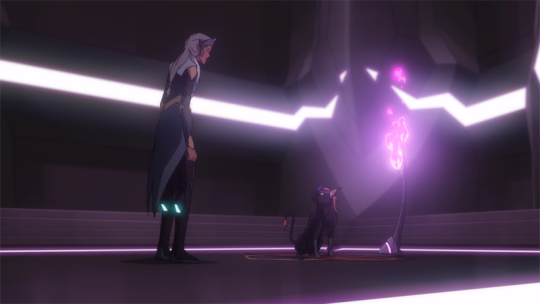
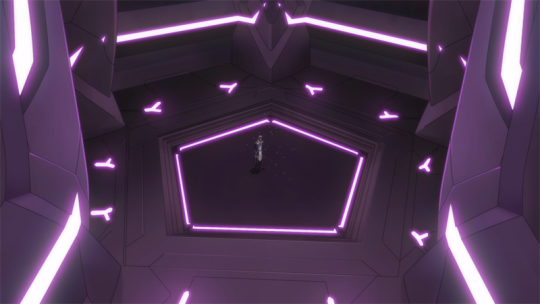
Goddammit.
This is continuing with the idea that Honerva is willing to sacrifice everything to save Lotor. And entire planet, her husband, even her cat for god’s sake...no one is safe.
Also, I just realized that she’s taken the flame Lotor lit at the Kral Zera. His cat and his flame, then..the only two things left of him.
Also, we’re solidifying the fact that the Galra, or at least the Empirical Galra, are as vampires. And it’s still meant to contrast nicely with the Alteans, who are said to be “life-givers.”
…...that felt really bad to type out.
- - -
Deification of the Son
Can I admit something?
I’d forgotten that the Alteans on the colony were said to have worshiped Lotor. It seems like so long ago at this point, and so much has happened in the meantime.

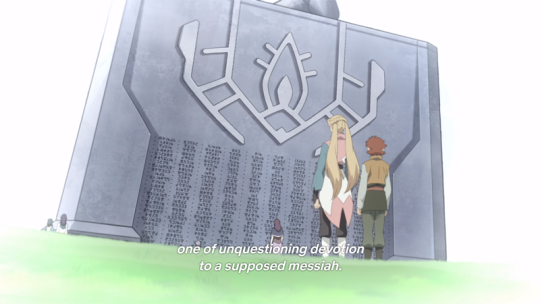
Romelle: And over time, the Alteans came to worship Lotor as their savior.
-
Romelle: [This was the world I was born into,] one of unquestioning devotion to a supposed messiah.
But this brought it all back to me.

Honerva:[speaking of the Galra] Your ways weakened a god.
Now this? This is interesting.
I get that the Alteans may have felt this way about Lotor. For generations they’d been told about how he’d saved them, protected them, cared for them. And given that he’s been alive all these years...yeah. I can see why they’d see him in a godly manner.
But why would Honerva feel this way? Why deify him herself?
Well...it’s not actually about Lotor. It hasn’t been since she entered the rift.
Lotor’s feats of alchemy are impressive, if you completely ignore the fact that he’s not the one performing them. He didn’t “pierce the veil”, Allura did. He didn't give Sincline it’s powers, Allura did. He only orchestrated it.
But by elevating Lotor to a god, she elevates herself further. In her speech to the gathered warlords at the Kral Zera, she says:
This flame represents Lotor, son of Zarkon, prince turned emperor, emperor that pierced the veil.
And my Altean blood coursed through his veins.
What a statement.
You see, Lotor is her’s. She created him. And if he’s a god, than she is the creator of a god. A flawed god, but one who’s best qualities he most certainly got from her.
Don’t get much better than that, huh?
And I feel like the Alteans of the colony agree.

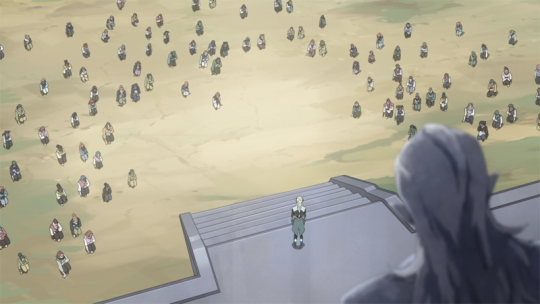
Merla: We pledge our allegiance to you, Honerva, mother of Lotor.
And that statue was there in Lotor’s time. He knew that they worshiped him. I guess he had no problem wit that. Like mother, like son I suppose.
Ya know, it’s kinda weird watching an actual cult being formed.

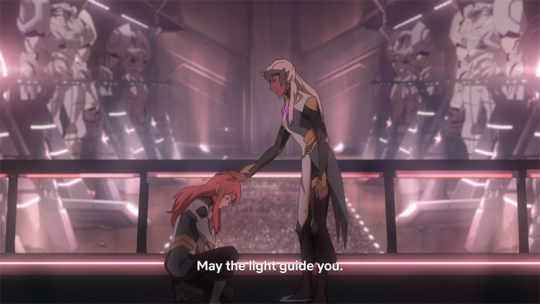
Honerva: May the light guide you.
Yikes.
- - - -
The Exile
It’s hard having the father that refuses to be happy with anything you do. When you grow up like that, you waste so much time trying to please them, to get them to love you. And it’s usually all for nothing.
We all learn this the hard way. It uh...it’s not typically as hard a lesson as Lotor learns here.
By all accounts, he’s done everything right. He’s done what his father wants, and exceeded all expectations. But he didn’t do it the way his father wanted it done, so he may as well have done nothing at all.
It’s..a familiar feeling. This scene got me real good.
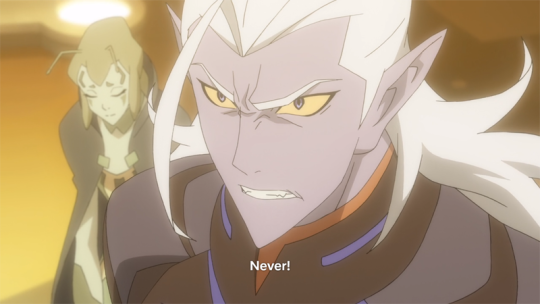
The rush of adrenaline you get as you stand up to your asshole dad for the first time is nearly intoxicating. You know, deep in your heart, that you’re right. You know that he’s being unreasonable. And you’ve had enough, so you say your piece.
And then, as it all comes crashing back down, and you realize how much power this man still has over you, and how your retribution is swiftly coming...well, it’s enough to make you sick.

But it’s no good. The damage has been done. You face your punishment.

Yeah...this still gets me real good. Added bonus of enabler mother, too.
….I keep feeling like I’m telling you all too much, but I really want you to understand where I’m coming from.
I feel for Lotor, I really do. He tried so hard, but there was no getting through to Zarkon at this point - there really hasn’t been much of Zarkon left since the rift incident. He’s only base instincts at this point, all power mad and unfeeling.
And now I”m going to say a few things about Lotor because, well...he doesn’t really show up again, does he?
My first point is that I wanted so desperately to see him come back, to start making up for the things he’d done.
He’d obviously picked up on his parents worst habits. In season 3, he was very much a threat; maybe not as much as Zarkon had been, but he was certainly far more clever.
I wanted to see him acknowledge these things in himself and work to rid himself of them once and for all. It would have been cathartic for me, because that’s something that I had to work on myself.
So to that end, I’m very upset that I didn’t get to have that; that neither of us got to have that.
With that said…
Lotor did some terrible things. He wasn’t some soft, baby; a poor, helpless abuse victim. He’s been an adult for a long time now. And when you’re an adult, you have to begin taking responsibility for the things you say and do.
I spent so long with my bastard dad that, even though I tried very hard not to, I picked up some of his personality traits. For a while, I was just the worst. But eventually, I came to realize these things in myself and I had to decide to make the change. I found my own redemption.
When we meet Lotor, he’s conniving. He has no problem torturing Throk. He has no problem luring Voltron into a situation where they might be killed.
He killed Narti.
Now, I do have to say, watching him do that, I was thinking “I understand the impulse”. I was surveilled too. My father's been know to show up where I am when I’m out with friends. Cameras in the house were not an impossibility. It makes you crazy, being watched like that all the time.
But he killed Narti. That’s, ya know...not ok.
I don’t think, in the end, that he was just using Allura. I’m not ever sure that at the beginning of his time with them that he was just using her. But he was keeping secret the fact that he had an entire colony of her people out there. Her people that he was using for energy production, against their will if Bandor was to be believed.
These things are not ok. I’m not sure if you can truly be redeemed from some of these.
I’m not here to judge, though. I just wanted him to have the chance to realize these things and do better, just like I had to.
I say this because, as I’d mentioned, I’ve written quite a bit on Lotor. I keep seeing all these other posts about how he’s done nothing wrong, and as an abuse victim, he can’t be held accountable.
That...has not been my experience, and it’s not a good way to look at things.
I take responsibility for the things I’ve done and said. Occasionally, someone will try to tell me that I wasn’t so bad, not really. But I was, and accepting that is part of the healing process. You have to break the cycle, and there’s no other way to do it.
Lotor didn’t get that chance. Everyone should get that chance, should they need it.
- - - - -
Well, that got needlessly personal. Let’s get to the stuff that didn’t fit elsewhere.
This guy is Macidus, Keith’s biggest fan.

I only noticed this time around because I have the subtitles on. This show really has a problem with that. Merla is named in the subtitles in this episode as well, even though her name is only spoken once, and in the second to last episode I think.
-
This is something I enjoyed.
Through the flashbacks, we see that it took a long time to build Zarkon’s base.
Here, before the scene with very small Lotor.
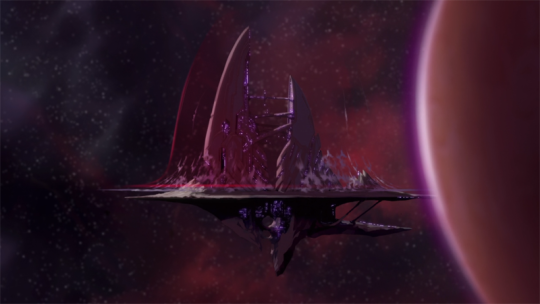
And here, with grown up Lotor.
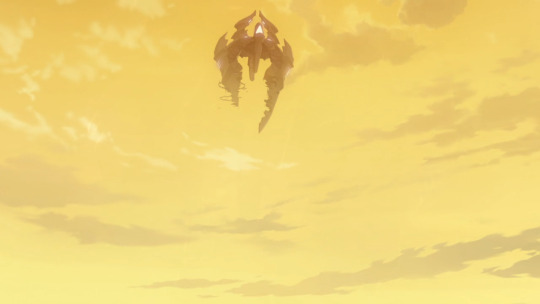
-
I’d seen somewhere someone post about how Haggar was wearing the same cloak she was in when she was dead. I believe they said it was her funeral clothes, probably something about how metal that was.
Well, I’d like to offer a different idea: She’s been wearing her maternity clothes the entire time.
-------------
In Summary:
Well, that was an episode. Things got explained fairly well, and we got some good backstory. Honerva has gone off the rails and has convinced the other Alteans to follow her.
What did you think? Did I miss anything important? Was I amazingly wrong about some things?
Sorry for all the...personal stuff up there. I wasn’t going to write all that at first, but it’s been on my mind. And hey, what’s the point of having a blog I you don’t use it as your own, personal confessional?
Next Up: ….wait, that’s it?
#second look review#voltron season 8#honerva#haggar#lotor#romelle#zarkon#voltron#voltron legendary defender
37 notes
·
View notes
Text
I love this interview! 👍🏼
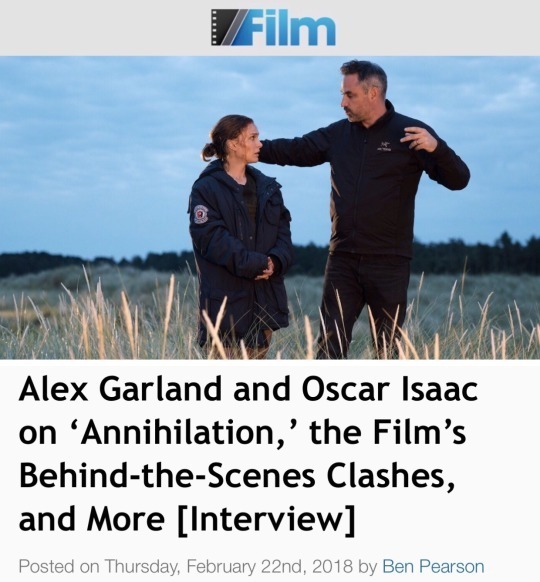
Writer/director Alex Garland set a high bar for himself with Ex Machina, his stellar 2015 directorial debut. That sci-fi movie had a lot on its mind, but his newest film, Annihilation, is far more cerebral. It’s one of the most challenging movies of the year: bold, beautiful, and haunting in a way that occasionally verges on being experimental.
Not long ago, I had the opportunity to sit down with Garland and actor Oscar Isaac, who plays a key role in the film, to talk to them about bringing this story to the big screen. We touched on the film’s behind-the-scenes clashes, whether or not Garland was concerned with audiences being able to keep up with what he’s doing in this movie, Isaac’s approach to his troubled character, and much more. Read our full Oscar Isaac and Alex Garland interview below.
Warning: Both Garland and Isaac occasionally drop spoilers in a couple of their responses. If you’re 100% spoiler-averse, I’d suggest bookmarking this and reading it after you see the film. Our interview follows.
***
For me, watching this movie was like walking through a beautiful nightmare. I have not read Jeff VanderMeer’s book yet, but can you tell me about how you crafted the visual aspects of being inside The Shimmer?
Isaac: Sure. (laughs)
Garland: (To Isaac) Go on, do it. (laughs) Yeah, we knew we wanted it to be beautiful and disturbing, often concurrently within the same shot. So really, what happened was, there’s a script. And in the script it’s straightforward in many respects, because it says, like, say, this scene, you’d say, ‘INTERIOR. HOTEL BAY. Three people sit around a coffee table.’ But then of course, production designers and set decorators need to make it something where you can stick a camera. So the script was disseminated among the collective, the group of people who work together, many of whom I’ve worked with for a long time – some of them twenty years. Me and [set decorator] Michelle Day and Mark [Digby] on the production design team, [producer] Andrew [Macdonald] – we’ve worked together on seven or eight movies, so we know each other backwards.
It all goes out, and really what happens is, a conversation starts. Everybody’s got a voice, and everybody’s chipping in, and an organic, evolutionary process begins and it doesn’t really stop. It doesn’t really stop until the picture’s locked. Right in the 59th minute of the twelfth hour, or whatever the right thing to say is, in the grade, these things are being affected hugely. How much do you saturate the colors? Where do you choose to desaturate? Where do you choose to put a bright point in the screen and do we have a vignette on the shot to focus? So it never really stops. It’s a big collective all working together and getting there organically.
Isaac: But at the same time, nudging it towards ‘What’s most disturbing?’ As an example, without trying to give away too much stuff, the ‘fight’ scene at the end between the alien and Lena. I was there for a lot of those rehearsals, and just seeing – it’s such an ephemeral thing. Why is it more disturbing if she’s less aggressive here, but pushing into her? Why is it weirder if this movement happens as opposed to this movement? It’s hard to say why, but it’s one of those things where we wouldn’t think of it, but then (nods to Garland) you’d suggest it, and suddenly we were all like, ‘Yep. That’s definitely creepier.’ Something as subtle as, this alien being, all it is is intention. So seeing the physicality of that idea happen. The collaborative part is, you say that, and then we have to interpret that. How do you physicalize just intention? Then somewhere that alchemy comes together, and everyone gets on the same page and creates something really crazy.
By the end, Kane turns out to be unlike any character you’ve played before. But in the beginning, I was noticing a couple of similarities to the soldier you voice in the Homecoming podcast. Did you think about that character at all when you were making this?
Isaac: Oh, is that right? No, I didn’t. That one, he was a private. Sure, he had kind of gone through some weird stuff, but I think with that one, there was a bit of an innocence. Kane maybe has…it’s a little bit of a different thing. There’s a deeper, darker bubbling thing underneath him.
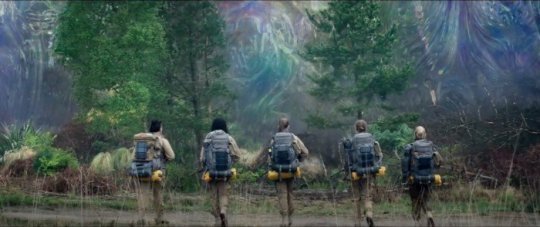
As the film goes on, it feels increasingly impressionistic and almost experimental at certain points. Were you worried at all about audiences not being able to keep up?
Garland: No. Not really. That’s not to say there’s anything to do with ignoring audiences. It’s not that. But it has to do with what you’re concerned with in relation to the audience, you know? For example, the kind of area where I’d think about it a lot would be to do with strangeness. So the film was, in some ways, conceived backwards. There was this crucial aspect to me that began as Natalie’s character is walking along the beach, and then contains the sequence within a lighthouse. I knew that was the goal, and I knew that I wanted us collectively to achieve a particular level of strangeness and beauty and oddness. Things like the dance sequence that Oscar was just alluding to. It needed to have information, but not information that was stated. It was more inferred. They key thing would be about strangeness, right? What it feels like to watch it. The crucial thing is what would it feel like? So then, you have to think, ‘How do you construct feeling?’
One of them, say in the case of strangeness, is that there’s a diminishing return with it. So if you begin strange, by the time you get to the end strange, you’ve got acclimatized to it and you’ve lost the thing that you’re shooting for. So that created a built-in structure, which on set and in pre-production, we used to call ‘suburbia to psychedelia,’ because it sounds neat and it’s a nice reduction. It’s a nice sound byte, isn’t it? But it’s got truth in it. Because if you start in suburbia, you start in our world, it gives you the chance of getting truly strange, in a way. So everything was sort of structured that way.
Along those same lines, there were some heavily publicized behind-the-scenes clashes about the making of this movie. I know you’re someone who’s not afraid to speak your mind, so I’m just wondering if you’re pleased with how it all turned out.
Garland: I only really give a shit about the film, OK? That’s actually all I care about. So as long as the film honors the intent of the collective, I’m basically happy. That’s what I care about. I think we did everything we could, and I’m proud of it, and I love it, so I’m fine with it.
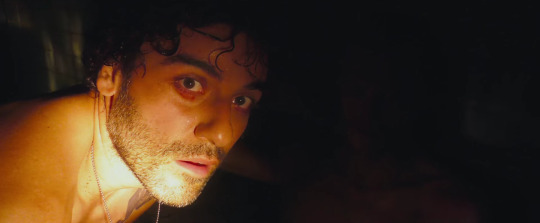
I’m curious about your process. What kinds of conversations did you guys have about Kane, and was there a moment when you were developing your take on him where everything clicked for you?
Isaac: (Jokingly) Yeah, I had it all figured out, and I walked in and said, ‘Shut up. Sit down. And point the camera at this.’ (points at his own face)
Garland: He set the lens. There was some discussion about the lighting, but Oscar won. That’s the way it goes.
Isaac: (laughs) Yeah, we talked. That’s what we do. We like to talk a lot and we think about things in similar ways, I like to think, and we have a similar sense of humor. So I think my first question was, ‘I know it’s not Predator with girls, but tell me why it’s not Predator with girls.’ No, I’m kidding. I just read it and thought it was fascinating and thought it was so strange and so beautiful, and I wanted to play this character. What was so cool is that he has all this stuff bubbling underneath, as I was saying, so that’s what was most interesting to me. There was almost a Pinter-esque quality to it, where there’s all these pauses and all of this subtext that’s just emanating out of these two people. But they don’t say it. Like Alex said, it’s inferred. So we spoke a lot about that. ‘What is it that’s happening underneath, and what is the nature of this relationship? What do I know now that I’m not saying? In this scene, now what do I know? What does she know?’ Trying to map those things out. Everything had a palpable energy between the characters.
Then coming up with different ideas: ‘Where might he be from? What if I try making his voice sound a little like this? What do you think about that?’ And then at the end, just the nature of the energy of how do we do this speech at the end that’s being filmed? What’s the reason we’re filming it? What’s the intent of it? Getting very specific about that stuff. That’s what a lot of it felt like. And with Alex, it always feels like we’re building a motorcycle together, or building a car. We’re just kind of handing each other the tools and making it together. That’s what’s really fun about it.
Garland: It was actually all built backwards. So for me, for what it’s worth, the whole thing was about earning the speech that Kane says at the end in this locked off shot that just sits there and lets him do it. It’s about the words that are contained there and the things he’s expressing there. Everything else is in support of that moment. The whole film actually is in support of the last thirty minutes, basically. Which sounds like a sort of stupid thing to say, because truly all films are. But actually that’s not exactly true. In a way, every single thing that happens is just inching your way towards this strange metaphysical sequence. And having it not as just abstract firework fun, but having content.
Isaac: Or pain. I think what the last thirty minutes are just this metaphysical pain and despair in some ways.
Garland:(To Oscar, jokingly) That’s how you’re choosing to sell the movie? Are you out of your fucking mind?
Isaac: Let’s go back to Predator with girls. Predator with girls! (laughs)
Garland: It’s true, though. It’s true.
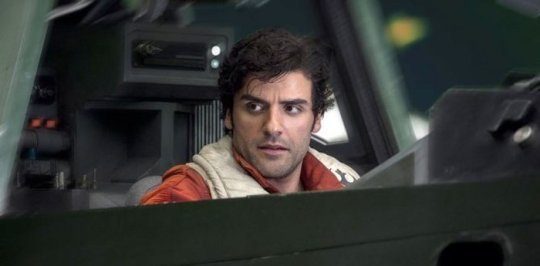
With this and Star Wars, you’re a part of two big recent sci-fi movies that proudly feature women at the forefront of the cast, which is really cool. I know you’re separated from a lot of the ensemble here, but tell me about working with Natalie on this.
Isaac: I was shooting Star Wars at the exact same time, too, so that was a wild thing to –
Wait, you were jumping back and forth between sets?
Isaac: It was literally the same studio.
Oh, cool.
Isaac: So some days I would walk from – I think I still used my trailer from Star Wars…
Garland: Yeah, we didn’t have trailers. But there were days where you were, on the same day, shooting both things.
Isaac: Yeah, there were. I would shoot something in the morning and then have a little bit of down time and then switch it up. So that was wild.
Garland: We’d catch him at his lunch break and say, ‘We’ve got to shoot this now!’ (laughs)
Isaac: I think I visited, too, still dressed up as Poe on the set.
Garland:Yeah, totally.
Isaac: It was pretty wild. It reminded me a little of Pee-Wee’s Big Adventure, when he’s on the lot and you see all the different actors walking around. There was something very classic about it. So there was very little time, and not a lot of rehearsal time, and Natalie and I didn’t know each other. It happens in movies, obviously – you have to suddenly be very intimate with someone very quickly. I think the fact that she was willing to trust me and I was trusting her, and we just went in there and did it and tried to find a real intimacy. Which is always a weird, awkward, strange thing to do suddenly in front of a bunch of people. But we found that, and I really enjoyed those scenes with her. She is very focused, but also in those scenes, very emotionally available as well, so I really enjoyed that.
Garland: It makes me want to name-check Rian [Johnson] and Ram [Bergman], the producer on Star Wars [The Last Jedi]. I think because they come from an indie film background, here they are making like the biggest movie of all time, and they were unbelievably helpful and accommodating to us. And they really didn’t have to be at all. Most big productions would not even dream of doing that. And they went out of their way – whilst making fucking Star Wars, for Christ’s sake – to help this really small movie next door. It was very cool and I’m truly grateful for it, actually.
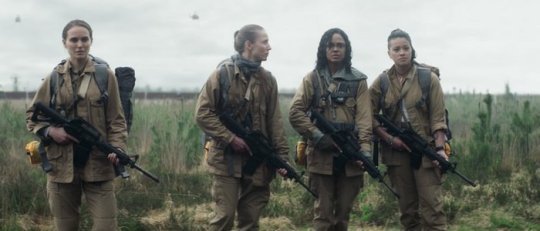
Making a movie with all female protagonists almost feels like a political statement today. Was that something that specifically drew you to this?
Garland: I really just want to dodge that question.
Really?
Garland: Yeah. The answer that I’m saying – which I’ve said before, so I apologize for it, but I’m in a position where this is the answer that I have – is that the previous film that Oscar and I worked on together [Ex Machina] had within it a very conscious set of deliberate arguments which related to gender and objectification. As well as other stuff about sentience and AI and all of that kind of thing. And what interested me about this project was the absence of an argument. So if I now talk about that, I dismantle the absence of the argument. So I’d just like to leave it at that.
Understood. You wrote this long before the Times Up and Me Too movements came to light, and I certainly don’t want you to explain the ending of your movie, but there’s some symbolism and imagery at the end that could be interpreted as being aligned with those causes. Does the film feel even more relevant now than when you wrote it, considering what’s going on culturally?
Garland: No, it doesn’t. I can’t lay claim to that. I wouldn’t want to. For me, it was a film, internally – by the way, let me just say, any time you present a narrative, in a book or a film or whatever the fuck it is, what is really happening is that fifty percent of the narrative is not provided by you. It’s provided by the subjective nature of the person receiving the narrative. So they fill in gaps, they provide stuff, they create agendas, whatever it happens to be. That is not problematic to me, that is just in the nature of the job. Right? For me, personally – so it doesn’t have to be for you – in as much as it is about something, which it is, to me, it is about the nature of self-destruction. It was about an observation I made, which is that everybody appears to be self-destructive. Some people are very obviously self-destructive because they’re addicted to heroin or alcohol or they act in a psychotic way or whatever, and they offer their self-destruction to you. Other people are very comfortable in their own skin, and they’ve got a fantastic job and a fantastic life and everything seems to be bulletproof. They feel like they’ve sort of cracked something about life. But then when you get to know them, you discover odd bits of self-destruction, which then become significant bits of self-destruction. It was the universality of it, that even the people who’d cracked it all had not cracked it all. And then I started trying to think –
Isaac: Where does it come from?
Garland: Where does it come from? Why is it that you have a really good marriage and you dismantle it? Why do you have a really good friendship and you dismantle it? Why do you have a really good job and you dismantle it? Whatever it happens to be. And the film essentially presents that question and an answer to that question by inference. To me, that is what it’s about.
*****
Annihilation hits theaters on February 23, 2018.
#spoilers#oscar isaac#annihilation#alex garland#behind the scenes#star wars#the last jedi#rian johnson#ram bergman#interview
88 notes
·
View notes
Photo
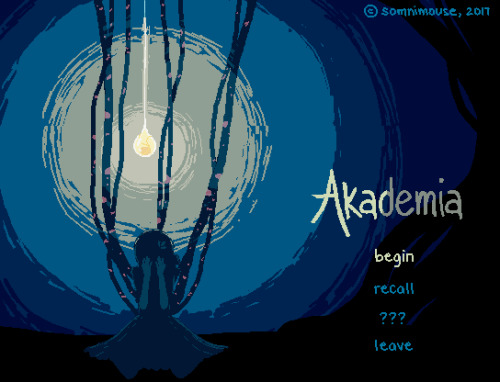
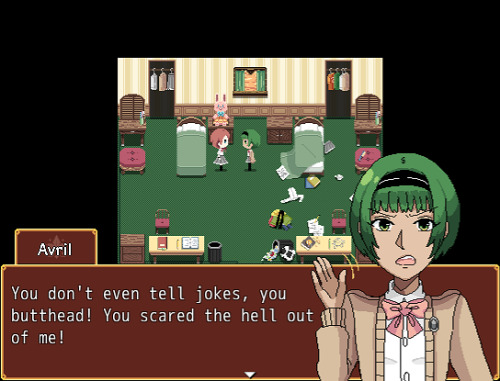
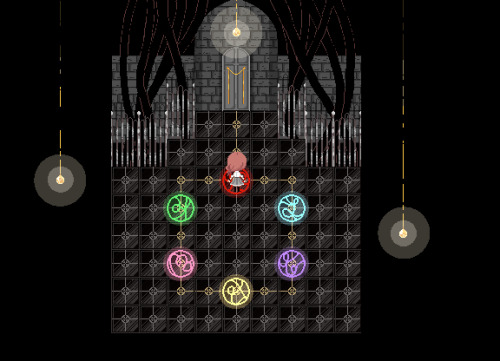
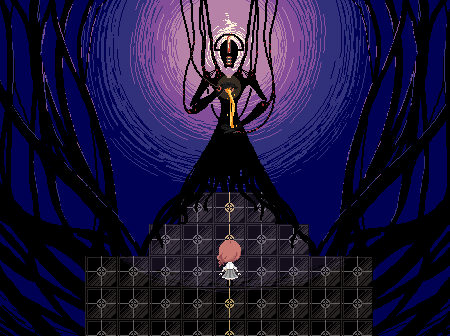
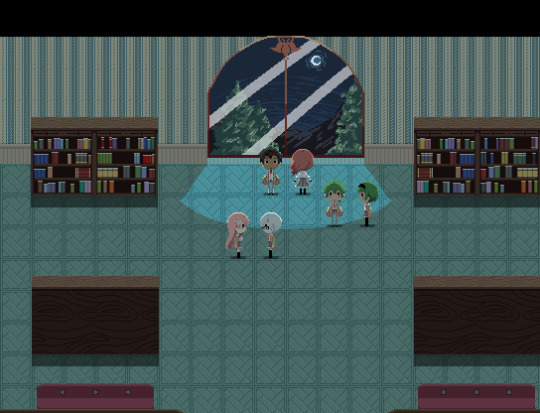
September’s Featured Game: Akademia
DEVELOPER(S): Somni ENGINE: RPGMaker VX Ace GENRE: Horror, Exploration, Puzzle SUMMARY: Akademia is a 2D horror RPG currently being developed in RPG Maker VX Ace. In the province of British Columbia, Canada, there exists a private school in the woods, Rayfair Academy, that is known for its wealth and ambition. The academy follows the motto, “Pearls are worthless in the pursuit of gold,” and it has a reputation for producing highly motivated and overachieving students. However, in a bout of curiosity late at night, six students uncover a secret, and the story of the school’s origin–and the being responsible for it–begins to unravel.
Download the demo here!
Introduce yourself! *Hello! I'm Somni, and I like to draw and write stories! I've been interested in RPG Maker games since 2013, and I'm a big fan of horror ones! I recently dived into community and I love how encouraging and positive everyone is. It motivates me to work hard!
What is your project about? What inspired you to create your game initially? *Somni: Akademia is a story-heavy horror game about six second-year students in a prestigious academy accidentally coming in contact with a strange and powerful being. As Margaret attempts to find her friends and lead them to safety, the story of the academy's past comes to light, and the otherworldly hollow they've all found themselves in starts to pick apart at the threads that hold their friendship together and prey on their minds.
I was always fascinated by occult and alchemy since I was small, and wanted to build on my love for them. However, I wanted to challenge myself and make the protagonists as ordinary as possible so I wouldn't have to rely on using magic to solve everything in the story. Akademia was also created when I was at a very low point in my life, so my struggles have made their way in. I'd say it worked out well in the story.
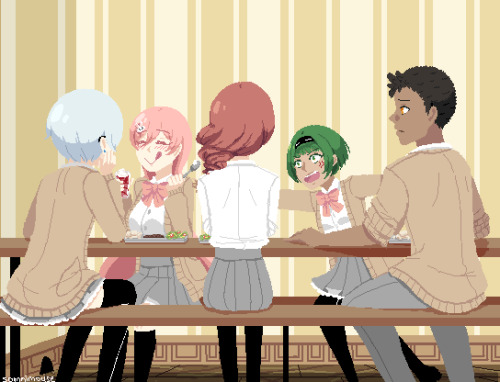
How long have you been working on your project? *Somni: I've been working on Akademia for more than three years now! The first two years were spent solidifying concepts and doing research, and the third year was spent doing game development. I kept the project to myself until I had a good grasp on everything, so it's only been public for a year.
Did any other games or media influence aspects of your project? *Somni: The Witch's House and Ib brought me into the RPG Maker engine, and they all have a very solid plot and cute character designs. Haunting Ground was also one of my favorite horror games because it delves into alchemy as well, and it lit a fire in me to work on my game.
Have you come across any challenges during development? How have you overcome or worked around them? *Somni: The first thing I always groan about is the discovery of bugs. Sometimes, I get careless or tired and add in weird things that mess with my game, and I can never find them until I backtrack or one of my beta testers points it out. Always add comments in your events so your mistakes can be found more easily, and remember to thank your beta testers, especially if they pick out lots of errors!
There are also times when I lose faith in myself and wonder if my game will ever be good enough compared to other games. I received so much love and support from the RPG Maker community, and I don't want to let them down. In these times, I remind myself that Akademia is for me as well, and I need to do my best no matter what.
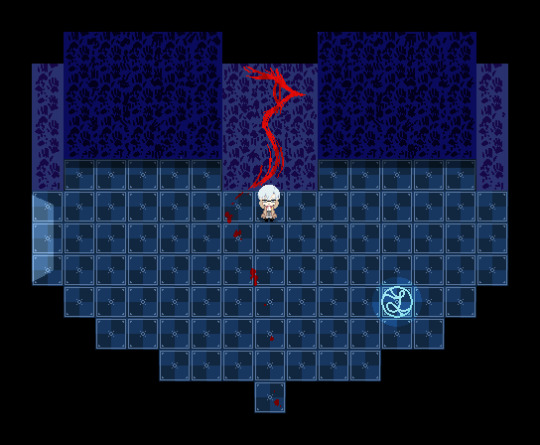
Have any aspects of your project changed over time? How does your current project differ from your initial concept? *Somni: Akademia's gotten a lot more sombre than it originally was. The first drafts I had were very campy, and the story didn't glue well with character development. I guess time and experience allowed me to reconstruct everything and make the plot and character development a lot better. I can take the story seriously now, and I love it a lot!
What was your team like at the beginning? How did people join the team? If you don't have a team, do you wish you had one or do you prefer working alone? *Somni: I like to work alone. I'm very picky about how things are made and written, and it would be a nightmare for everyone if I started micromanaging. A lot of things in my game are personal as well, and I'm hesitant to share them with others who can bend my experiences. In the future, I'll think about voice actors, but that's as far as I'll go.
What was the best part of developing the game? *Somni: Writing dialogue and making cute sprites! My characters have pretty different personalities, so I have a lot of fun making them interact and switching between individuals. I also wanted to make expressive sprites, so having small things like Jude tapping his foot or Austin rubbing his eyes makes development more fun for me.
Do you find yourself playing other RPG Maker games to see what you can do with the engine, or do you prefer to do your own thing? *Somni: I like to explore things on my own. I have a better understanding of the engine if I experiment and play around with things and see it fit the image I have in my head. Besides, you can do pretty much anything in RPG Maker if you get creative. I think getting inspiration from other games is the best and a very solid way of learning, but it doesn't work for me personally.
Which character in your game do you relate to the most and why? (Alternatively: Who is your favorite character and why?) *Somni: This is a bit of a hard question for me because all of my protagonists have a part of me in them. I'd have to say Mai is the one I can relate to most, but I can't say why because of spoilers. However, my favorite character is Austin because he's genuinely sweet and supportive. He's always there for his friends and wears his heart on his sleeve. There are other things I like about him, but they're all secrets!
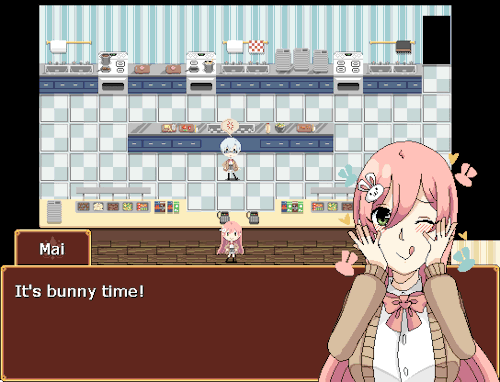
Looking back now, is there anything that regret/wish you had done differently? *Somni: Not really. Sometimes, I wish I released my game earlier. I spent three years on it and only just released a demo, but I also don't feel too badly about it. All that time I spent working on it allowed me to polish the story and characters, and if I released the game too soon, there could've been some huge oversights. Knowing this, I don't regret anything I've done.
Once you finish your project, do you plan to explore game's universe and characters further in subsequent projects, or leave it as-is? *Somni: I think I'll release some cute side stories in the future so the player can see how things are with the characters when Akademia's done and over with! As for the plot, there won't be anything else after the game.
What do you look most forward to upon/after release? *Somni: Definitely fan reactions! A lot of players gave me their thoughts and plot predictions, and they also gave me very suspicious messages about a lot of carefully worded things in the game. The full game has a lot more stuff to analyze, and I can just sit back and rub my hands together in glee. I can also draw more indulgent stuff with the characters when the game's finished, so it'll be a wild ride!
Is there something you're afraid of concerning the development or the release of your game? *Somni: Lack of time. I've had some health struggles all the way during development, and I'm going to be busy with work starting September. I'll have to dedicate all my free time to game development, and I'm hoping I can balance those well and give updates on Akademia's progress whenever I can.
Question from last month's featured dev: If you had to change the main genre of your game, what would you change it to and why? *Somni: I'd make Akademia a friendship simulator. Bonds between characters are an important part of the game, and if it can't be horror, it might as well be a cute and adorable thing.
Do you have any advice for upcoming devs? *Somni: This might not work for everyone, but try not to write your characters' dialogue as a long script before you put it into the game. What feels right in a word document might not sound natural in the game itself. If you can, stick to a skeleton of dialogue and flesh it out as you event it in the engine. That way, you can consider the environment and situation the characters are in while you write what they say.
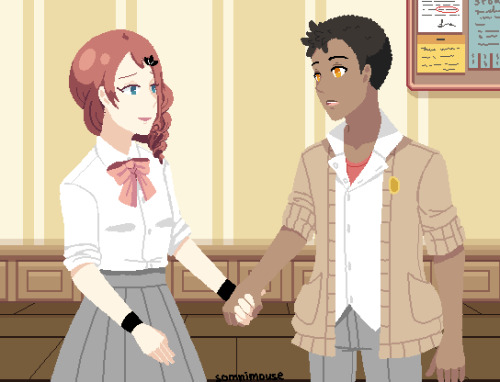
We mods would like to thank Somni for agreeing to our interview! We believe that featuring the developer and their creative process is just as important as featuring the final product. Hopefully this Q&A segment has been an entertaining and insightful experience for everyone involved!
Remember to check out Akademia if you haven’t already! See you next month!
- Mods Gold & Platinum
#rpgmaker#rpg maker#game dev#rpg horror#dev interview#akademia#akademia (game)#game feature#pixel games#gotm#game of the month
249 notes
·
View notes
Photo
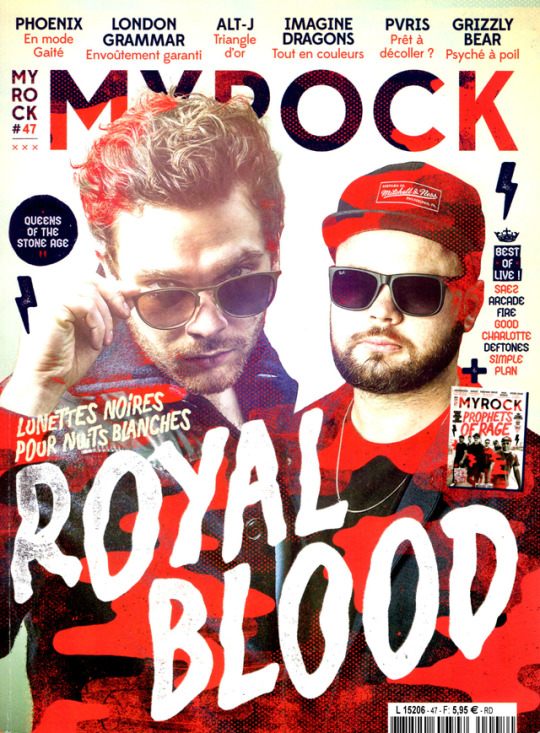
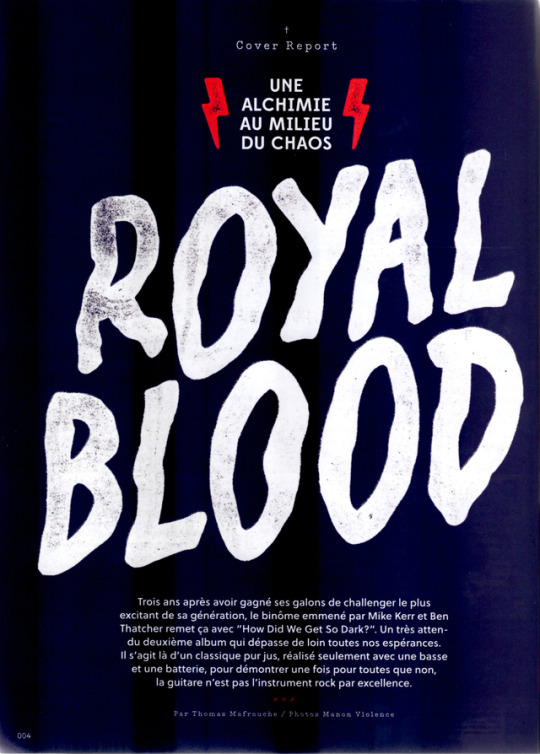
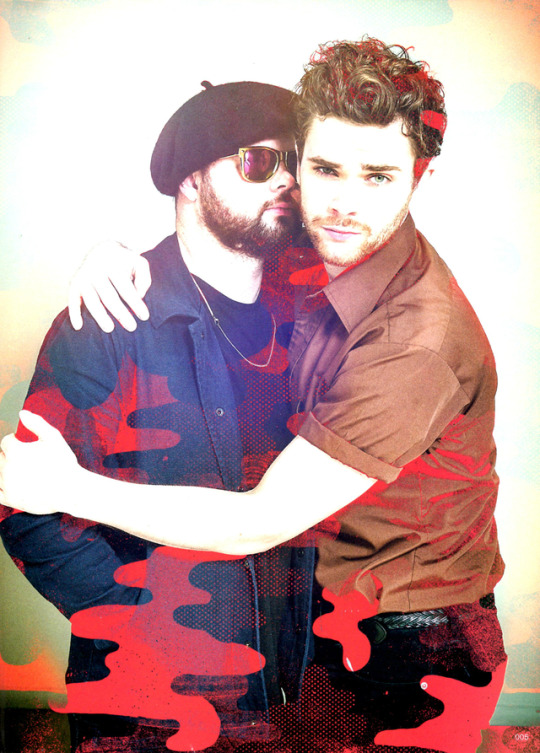
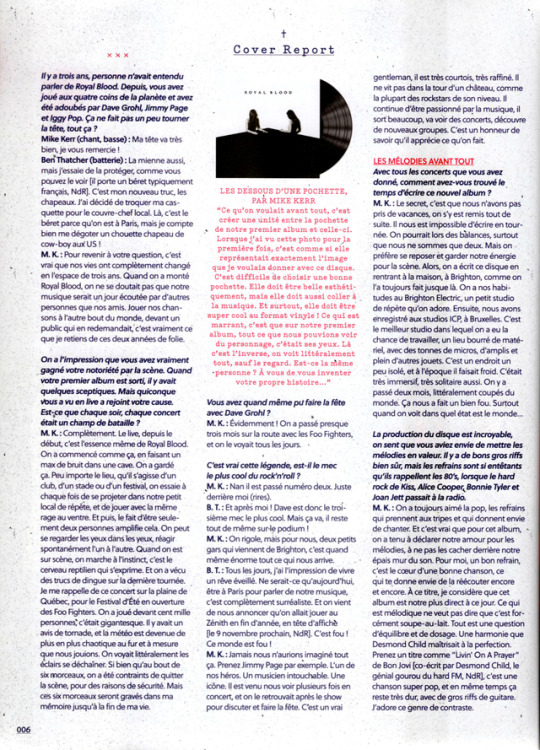
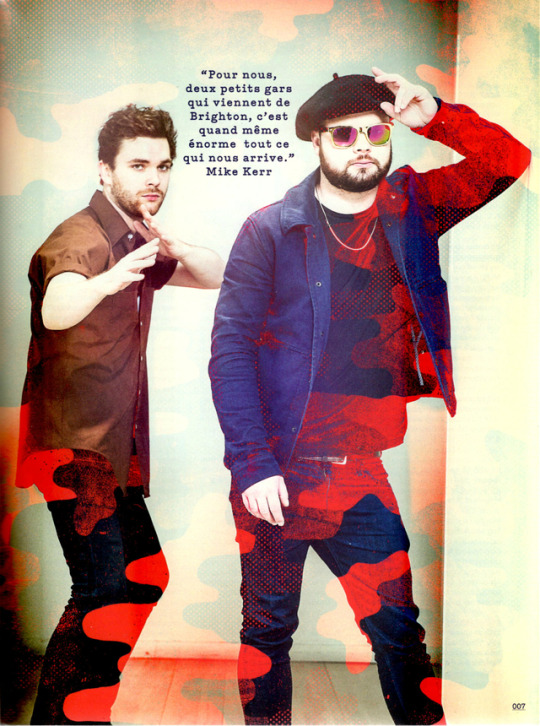
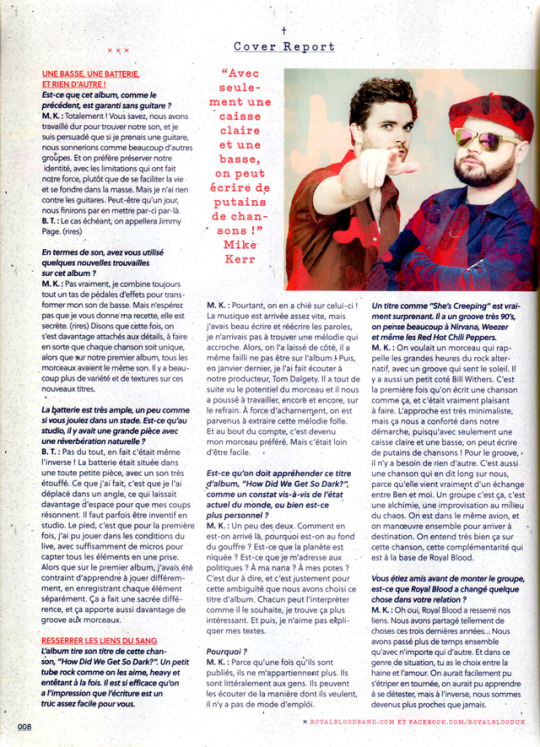
ROYAL BLOOD cover & interview in French magazine MYROCK #47, July-August 2017 (click to enlarge)
Translation of the interview below (thanks to @believersdie for their help)
ROYAL BLOOD
AN ALCHEMY IN THE MIDDLE OF CHAOS
Three years after winning the title of this generation's most exciting challenger, the duo composed of Mike Kerr and Ben Thatcher is coming back with "How Did We Get So Dark?" a long-awaited second album which exceeds our expectations by far. It's an authentic classic, played with only drums and bass guitar, to prove once and for all that no, guitar isn't the ultimate rock instrument.
(Thomas Malfrouche / Photos Manon Violence)
Three years ago, no one had heard about Royal Blood. Since then, you've played shows all over the planet and you've been taken under the wings of Dave Grohl, Jimmy Page and Iggy Pop. Doesn't all of this make your head feel dizzy?
Mike Kerr (lead vocals, bass guitar) : My head feels good, thank you!
Ben Thatcher (drums) : So does mine, but I try to protect it as you can see [he's wearing a typically French beret, note from the author]. Hats are my new thing. I decided to swap my usual cap for the local hat. Today, we're in Paris so it's a beret, but I intend to get a cool cowboy hat in the US!
M.K. : To answer your question, our lives did completely change in the space of three years. When we started Royal Blood, we didn't think that one day, our music would be listened to by people other than our friends. Playing our songs all over the world, in front of an audience who was always asking for more, that's what I'll remember from this two-year madness.
People are under the impression that playing shows helped a lot to increase your visibility. When your first album was released, some were skeptical. But whoever saw you live joined your adventure. Each night, each concert, were they just battlefields?
M.K. : Absolutely. Since the beginning, concerts are the essence of Royal Blood. It started up like this, making the most noise we could in a basement. We kept this. The location doesn't matter, whether it be a club, a stadium or a festival, each time we try to see ourselves in our small rehearsal premises and play with the same spirit as we did there. Moreover, being only two in the band accentuates this. We can look each other in the eye, react automatically to the other. On stage, we just follow our guts. And we lived awesome things on the last tour. I remember this concert in the plains of Quebec for the Festival d'Eté, where we opened for Foo Fighters. We played in front of a hundred thousand people, it was huge. There was a tornado notice, and the weather was becoming more and more chaotic as we were playing. We were literally seeing the lightning unleash. So much that we had to leave the stage after playing six tracks, for security reasons. But these six tracks will stay in my memory forever.
Did you get the chance to party with Dave Grohl anyway?
M.K. : Obviously! We spent almost three months on the road with the Foo Fighters guys, and we saw Dave every day.
Is the rumor true, is he the coolest guy in the rock'n'roll scene?
M.K. : No, he became number two. Right after me (laughter).
B.T. : And after me! So Dave is the third coolest dude. But it's okay, he's still on the podium!
M.K. : We're joking around, but for us, two small guys from Brighton, all that's happening to us is still unbelievable.
B.T. : Every day, I feel like I'm living a dream. For example today, being in Paris to talk about our music is completely surreal. And we were just told we are headlining a show at the Zénith [huge concert venue in Paris, note from the translator] at the end of the year [November 9th, note from the author]. That's crazy! This world is crazy!
M.K. : We would never have imagined all of this. Let's take Jimmy Page, for example. One of our heroes. An untouchable musician. An icon. He came to see us live a few times, and he met us after the show to talk and party. He's a real gentleman, he is very polite and sophisticated. He doesn't live in a castle tower, like most of the rockstars of his level. He keeps being passionate about music, he goes out a lot, sees many concerts, discovers new bands. It's an honor to know he likes our work.
MELODIES BEFORE ALL
With all the concerts you played, how did you find the time to write this new album?
M.K. : The secret is that we didn't take any vacation, we got back to work right away. It's impossible for us to write on the road. We could have, during sound checks, especially since we're only two. But we prefered to rest and keep our energy for the show. So we wrote this record after we went back home, in Brighton, like we always did up to now. We're used to going to the Brighton Electric, a small rehearsal studio that we love. Then, we recorded at the ICP studios, in Brussels. It's the best studio which we ever had the chance to work in, a place filled with gear, with lots of microphones, amplifiers, and other toys. The location is quite isolated, and at the time the weather was cold. It was very immersive and very solitary. We spent two months there, literally cut off the world. It did us good. Especially when you see the state of the world we're living in...
The production of this record is incredible, the audience feels like you wanted to highlight the melodies. Of course, there are good old riffs, but the choruses are overpowering, they remind of the 80's, when Kiss', Alice Cooper's, Bonnie Tyler's and Joan Jett's hard rock was on the radio.
M.K. : We've always loved pop music, choruses that blow you away and make you want to sing them. For this album, we wanted to declare our love to melodies and stop hiding them behind our wall of fat sound. For me, a good chorus is the heart of a good song, it is what makes you want to listen to it over and over again. As such, I consider that this album is our most direct album. What's melodic isn't necessarily hot tempered. It's just a matter of balance and dosage. Desmond Child mastered this harmony perfectly. For instance, "Livin' On A Prayer" by Bon Jovi [co-written by Desmond Child, note from the author] is a pop song, and at the same time it's very hard, with fat guitar riffs. I love this kind of contrast.
BEHIND THE ALBUM COVER, BY MIKE KERR
"Firstly, we wanted to create a unity between the cover of our first album and this one. When I saw this photograph for the first time, I felt like it represented exactly the impression I wanted to give with this record. It's difficult to choose an album cover. It must be aesthetically pleasant, but it must go well with the music too. And especially, it must be cool on vinyl format! What's funny is that, on our first album, you could only see the eyes of the character. Here, it's the opposite, you can see everything except the eyes. Is it the same person? You can create your own story..."
BASS, DRUMS, AND NOTHING ELSE!
Just like the previous one, is this album guaranteed without any guitars?
M.K. : Totally! You know, we worked hard to find our own sound, and I'm sure that if I played a guitar, we would sound like many other bands. And we'd rather keep our identity with the restraints which became our strengths, than make it easier with a guitar and blend in with the crowd. But I have nothing against guitars. Maybe one day, we'll end up adding some here and there.
B.T. : We'll call Jimmy Page then. (laughter)
Speaking of sound, did you use some new finds on this album?
M.K. : Not really, I always combine a lot of pedals with effects that transform my bass' sound. But no need to hope that I tell you my tricks, they're secret. (laughter) Let's say that this time, we minded the details way more, we made each song unique, when in our first album, all the tracks had the same sounds. In these new songs, there are a lot more variety and textures.
The drums are very wide, as if you were playing in a stadium. Did you play in a huge room with a natural reverb in the studio?
B.T. : Not at all, it was actually the opposite! The drums were in a tiny room, with a very muffled sound. I moved them in an angle of the room, which left me more space so that my hits could resonate. Sometimes you just have to be creative in the studio. The best thing is that for the first time, I was able to play in live conditions, with enough microphones to record all the parts at once. In the first album, I had to learn to play differently and record each part separately. It's very different, and it makes the tracks more groovy.
STRENGTHENING THE BLOOD RELATIONSHIP
The album gets its name from this song, "How Did We Get So Dark?". A good old rock hit just the way we like them, heavy and overpowering at the same time. It's so efficient that we're under the impression that writing songs is quite easy for you.
M.K. : Yet we suffered with that one! The music was composed quickly, but as much as I wrote and wrote the lyrics again, I couldn't find a catchy melody. So, we left it out, and it nearly didn't make it to the album! Then, last January, I made our producer Tom Dalgety listen to it. He saw the potential of the song right away and encouraged us to keep working again and again on the chorus. Eventually, we managed to dig this crazy melody up. And in the end it became my favorite track. But it was far from easy.
Is this album title, "How Did We Get So Dark?", an assessment about the current state of the world which we live in, or is it more personal?
M.K. : A bit of both. How did we get there, why are we at the bottom of the pit? Is the planet fucked? Am I speaking to politicians? To my girlfriend? To my friends? It's hard to tell. This ambiguity made us choose this particular title. Each one can read into it whatever they like, I find it more interesting. And, well, I don't like explaining my lyrics.
Why?
M.K. : Because once they are released, they don't belong to me anymore. They literally belong to the audience. They can listen to my lyrics the way they want, there are no instructions for use.
A track like "She's Creeping" is really surprising. It's got a very 90's groove, it reminds of Nirvana, Weezer, and even the Red Hot Chili Peppers.
M.K. : We wanted a track that reminds of the greatest hours of alternative rock, with a groove that smells like sunshine. There's also a bit of a Bill Withers side. It's the first time we had ever written a song like this, and it was very pleasant to do. The approach was very minimalistic, but it reassured us on our process, because with only a bass guitar and a snare drum, you can write fucking good songs! The groove doesn't need anything else. It's also a song that says a lot about us, since it was born from an exchange between Ben and I. That's a band, it's an alchemy, an improvisation in the middle of chaos. We're in the same plane, we're working together to reach our destination. The complementarity which is the base of Royal Blood, you can really hear it on this particular song.
You were friends before starting the band, did Royal Blood change anything in your relationship?
M.K. : Oh yes, Royal Blood tightened the bonds between us. We have shared so much during these last three years... We spent more time together than with anyone else. In this kind of situation, hatred and love are your only options. We could easily have torn each other apart on the road, we could have learned to hate each other, but the opposite, we became closer than ever.
#royal blood#mike kerr#ben thatcher#royalbloodvevo#royalblooduk#yall better read this interview till the end i spent an entire afternoon working on that translation#but well it was fun & it made me practise english so thats cool#also my scans are not really high quality but thats the best i could do :((#also dont let this flop pls#**
87 notes
·
View notes
Photo
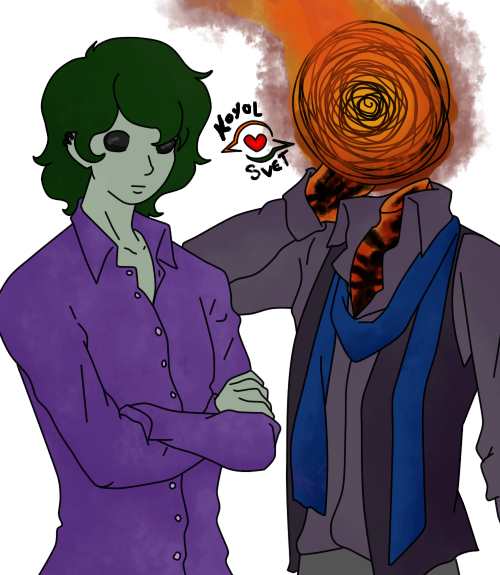
Koyol and Svet, The Transient God and the Old God, The Mutant Snake Man and The Man of Heat and Light.
Koyol (nicknamed Kyle) is a mutant amalgam of many things- mostly Snake, but also Human, Earth, Plants, and other animal composites. He came into existence at an unknown point in time with the mind set of perhaps a small animal where as “one day, I was there” and slowly developed more human feelings like curiosity and questioning, to which he eventually left the whole he came into existence in. His agine speed decreases as he got older, and he spent many many years as a child, “civilized” by a human village that caught him and passed around like a plauge between homes as he’d outlive every family since he aged so slow. He eventually becomes an independent adventurer and traveler, and makes many great discoveries, including finding a Gem of Power, a special artifact known as the Universal Emerald (which isnt actually an emerald its Tsavorite) as well as his life long companion, an Animal Spirit in the form of a Snake from an Egg that would never hatch which Koyol found in his original Hole, so named Katrina. with the Emerald, Koyol’s travels massively expanded, and he went from having traveled everywhere in his own land to Traveling an infinite number of other worlds which he studies in grave detail. He picks up new incredible skills from each universe he visits and has even met many other versions of himself, including his Self from Svet’s universe. Over the course of his travels, others who could travel between worlds or had a knowledge of him refered to him as a nonexistant mystery beings known as The Man They Call Universe, as well did Koyol’s constantly increasing powers and skills make many think he was a god and many universes develop cults in his dedication.He’s recognized as a Snake Prince in his home world, and a god or King or many other titles in others. Svet’s world recognizes Koyol as a Transient God- a god that was once mortal but has such immense power, they can no longer be considered mortal. He has a massive arrayal of skills and abilities from ordinary mundane things he’s learned by studying cultures like Cooking, Instruments, Weaving, Writing, etc, to great powerful abilities that come from other universes, like Flow Alchemy that he learned from a universe he calls Alchemhaven (aka, the universe of Full Metal Alchemist), or Water Controling skills from another universe, Avatara (aka, the Universe of Avatar the last Airbender). As a part of being a mutant, Koyol’s body is productive of a strange and difficultto study ‘energy’ similar to radiation that can be dangerous to others over a prolongued exposure lasting years- for example, his childhood companion and one-time brother Kal, who has become severly deformed, lost two limbs and some fingers to a slowly decomposed body, and is still alive despite having known Koyol when he was a child (his aging process has slowed along side Koyol’s, but at a lesser rate, and physically he appears to be 45). Another mutation of Koyol’s mutant DNA has been a deteriorating Psychosis, more likely from an increase in bad experiences over his very long life. However, Koheu is a second being withing Kyle’s mind and within his soul, essentially a second person completely, that comes from being amutant and has been recognized as Koheu, Ender of Worlds. A chaotic, hateful man inside kyle’s head that is far beyond reason, and knows everything koyol can and do everything he can do. Kyle’s greatest passion is to Learn and to Travel, and over his life he has adopted 4 children, including his only son who has a grandchild. He’s a fiercly protective man who’s Loyalty is is at a dangerously lethal level, and his anatomy and body are all sorts of strange. He’s established his own group called the Rainbow Squad, a massive collection of people with special skills seeking escape from their original lives and to make the multiverse a better place, including training programs for abandoned children who are housed there, and massive workings of members and affiliates. Koyol is incredibly old and his biological downtick has officially stopped, and he no longer ages at the physical age of 24. Svet jokes the Koyol has to be at least half his age (which is a joke, because Svet doesnt have an age and has always existed.), and frequently refers to Koyol’s age as ‘about half as old as forever’.
Svet on contrast has a very different life story. He’s an ethereal being that was both there before time- therefor, before there was a before- and came into existance when the first light and the first heat could exist. as an Old God he is physically Immortal and unbound to a single body or even having a form at all. His life is a blur of partial omnipotence as he watched the universe form around him, within him. He knows every god, even the Void Gods that never existed, excluding some ‘newer’ Demigods or other sorts that only newly reached divinity. As long as there have been humans, Svet has been fascinated with their lives. At one point a Tyrannical dictator, at another point pretending to be a human himself, and currently just living as a god among people. Svet has almost always been a popular deity among people and has had many temples, shrines, and wars have been fought in his name. While a light hearted man on his most usual, he is a wrathful and dangerously powerful person who makes almost no corporeal sense. He’s a man of a million loves, a million friends. He has a single daughter. and while fiercely protective and Loyal... there are parts of him that would make others think otherwise, and many have eventually figured that out after a lifetime in his companionship. History on Svet is surprisingly sparse and it seems his go-with-the-flow lifestyle has meant much of his life is lesser known to others.
most of my characters tend to share specific ideals or traits strongly because im not sure how to portray other things- per example, many of my characters are Polyromantic or Polysexual, since i personally dont really see the concept of why someone would be conflicted loving two people and blah blah blah. the point is, all my characters are similar in a certain angle.
However, the conundrum of these two to me is always fun, because they to me are so... similar, and yet, there is virtually every possible reason to call them complete opposites, even down to fundamental cores.
Examples.
Koyol has lost many loved ones over the course of his long life; he finds the memories of them all very painful, and lives in constant dread of each person he knows dying, and knows they will. Contrastingly, alough Svet has also lost many over the course of his long life, He is disconnected from this sort of pain then a normal person or most gods are. His attachments are lesser, he mourns very shortly, and rarely worries or thinks twice about the passing of someone he knows,
Koyol lives a very isolated way that would make it seem as though he’s Distant, but in actuality, he gets attached very quickly and very strongly, and sees most people he knows as family. Svet, while living an outgoing and friendly, active life and meeting many people and many relationships, is actually incredibly distant from most if not all people, and cares deeply for incredibly few people in his life to the point it is very surprising.
Koyol and Svet share a strong strain of protective nature and loyalty. However, Koyol is self-sacrificing Loyal to even people who barely consider him an acquaintance. to those he values he would even readily die just at their request if they wanted him to. Svet on contrary is not self-sacrificing, or at least not nearly as much as Koyol. He will go out of his way to help friends, but wont go so far as to give up his own for simple friends or even others closer to him.
Svet is a very forward, touchy person and communicates bast with his hands, and is very physical-contact oriented. Koyol, on contrast, will most likely never touch you if he neednt. In his culture, even light touches were considered very intimate. He is also just naturally a not-touchy person and would prefer to keep a good personal bubble from others.
Svet is incredibly sensitive and is constantly aware of anything touching his body or the stream of fir- be it every fiber of his clothing to every particle of dust that settles on his skin, as a result of his body being a ‘projection’ of sorts. Koyol, contrarily, has two layers of “skin”. the top layer is extra flesh and skin and his sense of touch is extremely dull. Occasionally he sheds this layer (which is a disturbing messy process) by flexing the second layer- a layer of razor sharp, uniquely hard black scales that tear the top layer of green skin off. This layer is incredibly sensitive, though not as much as Svet’s. While his top layer is very, very dull, his hair is quite sensitive. dont pull it. hes tender headed.
Koyol’s curiosity and interest is incredibly studious, and he wants to learn essentially everything. if he doesnt know it, you can talk his ear off and he’ll be intrigued. Svet, however, while paying attention, is doing so more out of courtesy and more so to learn about you then because he actually ever cares about a topic- he rarely does.
all of Koyol’s traits/skills are hard earned, for the most part. he worked and learned them. Svet is more of a savant with natural skills in things he enjoys.
Koyol will rarely use your name. In his culture, using a name specifically to you face is intimate. He only uses names to refer to another person when talking to someone, and otherwise uses nicknames. Also, in his culture, most names start with a K or have many Ks. Svet uses names consistently, and prefers full name use to shortened nicknames (referring to Chelo as Chelovek, or calling Koyol by his name rather than his eaiser pronounced Nickname Kyle.).
Koyol is fluent in almost any language he’s ever heard of, and can communicate with any culture he’s ever met- the biggest exception to this is that he cannot use Sign Language, not for a lack of trying; he can read it easily if someone signs to him, but his hands are not flexible enough for signing and many of his gestures look wrong. to the contrary, Svet only knows Sign language, Morse code and English and has shown to have great difficulty learning new ones should he try, and rather learns more universal languages that arent spoken. He’s currently trying to learn computer Binary and how to read various Ciphers.
While they both strongly enjoy cooking and are very good at it, Koyol cannot taste sweet, hates sour flavors, and loves milk; Svet cannot taste sour even in a human body, loves Sweet flavors, and cant stand milk. They both enjoy cultural dishes. Koyol strongly refuses on drinking if he can but is fairly easy to peer pressure into it, and is a surprisingly loose-lipped drunk; Svet loves partying and quite enjoys a drink but its nearly impossible to peer pressure him into it- or anything- and is a very cut-loose, party-type drunk in any body except his normal firey one, where alcohol makes hime a more angry drunk as it reacts with his core.
They are different as fuck so i dunno why to me they see so similar.
#i have 0 memory of writing this#or drawing it#what the hell#it was just in my tabs open#what#Svet#Koyol#headcanon
4 notes
·
View notes
Text
‘Crashing’ Pete Holmes Interview HBO

Pete Holmes as a struggling comic in ‘Crashing’ (Credit: HBO)
Honesty may be a lonely word, but it’s also an essential ingredient of Pete Holmes’s brand of comedy. The 37-year-old comic has a history of using his stand-up sets, as well as his popular podcast, You Made It Weird, to tackle deeply personal subjects. Now he’s bringing that honesty to HBO in the form of Crashing, a semi-autobiographical series created and starring Holmes and produced by Judd Apatow. While set in the present day, the show is predicated on a story from the creator’s past when his marriage fell apart at the same time he was struggling to launch his comedy career.
Kicked out of his house, Holmes’s TV counterpart (also called Pete Holmes) couch-surfs in the living rooms of such established comics as Artie Lange and Sarah Silverman, who also play themselves. Holmes tells Yahoo TV that liberties have definitely been taken in translating his real life into fiction, but revisiting that part of his history has offered a fair amount of catharsis. “Re-living the heartbreak was difficult; you’d be shooting it and thinking, ‘This is really heavy.’ But then editing it, you make it funny, too. So it’s fun in that regard, and also healing.” Holmes also revealed what it was like to purposely bomb in front of a live audience and why he hopes that his short-lived late-night talk show, The Pete Holmes Show, attains Ben Stiller Show-like cult status.
When I spoke with Judd Apatow about Crashing, he suggested this is a very personal story for you. How did you go about transforming it into the events we watch on the show? The story is really, really personal. It’s been fictionalized, certainly, and changed. If you just tell things exactly how they happened, first of all, legally, that’s a nightmare. Second of all, it’s not as interesting as you might think it is. You need a master like Judd to elegantly, efficiently, and hilariously bring it out. Judd very naturally thinks in stories. One of the first things he did was to tell me, “Just write 10 pages on everything you remember about that time.” So I e-mailed him a document that was filled with truly embarrassing admissions and sad things. I have no problem delving into the tragic to find really, really funny things, and he and I have that in common. My parents still have no idea how this is a comedy! [Laughs.]
You have to tell them, “No, this is funny — trust me.” Yeah, I know. I think when it’s not your son [it’s funnier]. My dad thought the show was going to be like The Odd Couple, with crazy hijinks happening and a different roommate each week. I suppose he’s not entirely wrong. There are hijinks and it is certainly very funny. The pilot kind of does the heavy lifting in terms of getting most, though not all, of the tragedy [out of the way] and then it gets rolling and gets really funny.
Did you always intend to play a version of yourself on the show? The initial conceit of the show was to have everybody playing themselves. That was very important to me. I wanted to create this world where the only person that regressed was me. I’m playing the 2007 version of myself, but everybody else is the 2016 version of themselves. Which is funny because someone like T.J. Miller, who appears in the second and third episodes, is a real person and a real friend. When I actually got divorced in real life, we went to Pittsburgh and spent a week there, just cheering me up and having fun. The difference between T.J. in real life and T.J. in the show is that when I was with him in 2007, he wasn’t famous yet. But on Crashing, he’s playing the post-Deadpool T.J. whereas I’m [pre-fame] Pete. So it’s a little confusing, but once people get into the show, I don’t think they’re going to be saying, “I don’t get it — where’s his podcast?”
youtube
Was it strange to put yourself back in the place of being a comedian who isn’t established as you are now? Oh, yeah. I was joking with Judd that the scenes [in the pilot] where I had to perform at an open-mic and bomb was the most painful part. [Laughs.] There’s 300 people there, and they’re extras. Your body still kind of goes into that fight or flight response, and you get that back sweat. And even though you know it’s the story that you’re not supposed to be good yet, it still bothers you a little bit. Still, I think the whole process was a little bit therapeutic. I wish everybody could have an opportunity — maybe they could on a smaller scale — to recreate some of the trauma from their lives like the pain of starting out in stand-up and going to a club where they don’t know you and don’t even want you. [Reliving that moment] I was like, “I don’t know how I did it.” If I was 37 and starting as an open mic-er it would be a real challenge.
I’m curious — how did you ensure that you’d bomb onstage? Did you deliberately write bad material? Or was the audience of extras instructed not to laugh? One, stand-up is so hard. Even if you are trying, you probably won’t do that great. We treated our background actors well, but there’s still a cattle call element. There’s 300 of them, so some production assistant with a headset is going to, at some point, bark at them to stay in line or be quiet or whatever. It kind of feels like a schoolroom in that way, so it’s not a great [environment]. Also, the alchemy of stand-up is so specific. The darkness and coldness [of the club], and also the alcohol can help. That’s when people want to unwind. But if you’re performing at 2 p.m. in a hot room and there’s a group of actors there who aren’t your friends and aren’t on dates, they just want to make a fast buck and they saw this ad on Craigslist, it’s hard to turn that into a good show. I didn’t have to work very hard to bomb! [Laughs.]

Holmes crashing on comic Artie Lange’s couch in ‘Crashing’ (Credit: HBO)
Judd also taught me something he learned while making Funny People, which is that if you want the audience to stop laughing, just keep telling the same joke over and over without warning them. That way, you’ll get the comedian acting believably, but the audience will make certain sounds and groan and it’s not fake because they’re actually feeling it. What was more remarkable was that Artie Lange and T.J. had great sets [in the same setting]! I was in the easier position where I was supposed to do badly, so the pressure was off. It still sucked, though. I wanted a stiff drink afterwards.
Related: Judd Apatow Talks Final Season of ‘Girls,’ His Next HBO Series, ‘Crashing,’ and the Return of ‘Love’
You mentioned your podcast earlier, and that medium has been one way that contemporary comedians are connecting with their fans. We seem to go through cycles where stand-up comedy becomes intensely interesting to people. Is podcasting the key to the current fascination with stand-up? In the past, “comedian” was a very convenient job for the lead in a sitcom to have, because it explained very quickly why he was funny, and why he probably had an OK amount of money. You didn’t wonder why he was able to go on vacation or eat in a nice restaurant. When Jerry took that girl up to Vermont on Seinfeld, nobody thought, “Why does this guy have all this time off?” Our show is a little bit different in that we want to talk about what it’s like to start out as a stand-up, to see the comedian’s origin story. Judd and I were really excited by that.
More to your question, I think, if you look at someone who I admire very much like Louis C.K., being a comedian is the perfect excuse to be very honest. And that’s been encouraged by the rise of podcasts. We now know what it’s like to upload a comedian into your brain through hundreds of podcasts. I barely know Marc Maron, but I feel like I know him so well from listening to WTF. With the advent of podcasts, we’ve gotten a taste for blood — you know what I mean? The premium is higher than it’s ever been for humor that’s authentic and transparent. And with our show, we’re bleeding on the page in some ways. We’re telling secrets. It’s comedy soaked in something relatable and true, and I would argue even a little bit mythic.
youtube
Prior to landing at HBO, you hosted The Pete Holmes Show in the post-Conan spot on TBS. Looking back on that series now, how do you feel about your experience in late-night TV? I’m actually wearing Pete Holmes Show pajamas right now! [Laughs.] I wish I had taken more pairs of them — these are getting kind of dingy. I’m the type of comedian that will blame the audience. I’m not saying I blame the audience of The Pete Holmes Show, but I’m very quick to say it was an algorithm — it was a ratings thing and it was the structure of TBS at the time. I know TBS has changed since then, and I’ve had a couple of people [casually] tell me that our show would have done better in the climate they’ve created now.
But I wouldn’t have changed a thing; I’m so proud of it, and I think we did something special given the parameters and the budget and everything. We were shooting nine episodes a week, often months in advance. I’d come out and say, “Hey, it’s Christmastime,” and it was August! I’ve said before that we did exactly the number of episodes we could’ve done before we would’ve started eating ourselves. I really want Netflix or somebody to put it out — we had to take it off YouTube for some legal reason. I’m holding out for the Ben Stiller Show later-appreciation thing. We’ll see if it happens!
Crashing premieres Feb. 19 at 10:30 p.m. on HBO.
Read More:‘This is Us’ Recap: What Would Jack Do?‘Doubt’ EPs Preview New Drama Starring Katherine Heigl and Laverne Cox‘Sun Records’ Exclusive: Chad Michael Murray on Playing ‘Big Personality’ Sam Phillips
#_revsp:wp.yahoo.tv.us#hbo#comedy#_author:Ethan Alter#_uuid:ed345c89-28af-3974-ad37-0b62eb560467#crashing#_lmsid:a0Vd000000AE7lXEAT#pete holmes
1 note
·
View note
Text
The Hard Work of the 2020 Instagram Spouse
New Post has been published on https://thebiafrastar.com/the-hard-work-of-the-2020-instagram-spouse/
The Hard Work of the 2020 Instagram Spouse
Not long before the second presidential primary debate, a new photo popped up on Douglas Emhoff’s Instagram feed—a grinning selfie with his wife, Kamala Harris. The accompanying caption was brief, almost an afterthought: “Hello Miami! See you all at the debate on Thur!”
It was typical for Emhoff’s feed, which started in 2013 but had accumulated only about 60 posts by the time of the debate, mostly a smattering of low-key snapshots, like a private photo album that was accidentally dropped into the public sphere. Emhoff posted the day he dropped his son off at college; on his father’s birthday and Father’s Day; on a visit to his wife’s office in Washington, D.C. Things picked up in January, when Harris announced her presidential bid, but still, the feed retained its casual, DIY feel: mediocre lighting, questionable cropping, selfies galore.
Story Continued Below
This has Emelina Spinelli concerned. “It’s selfies. It’s all selfies!” she repeated, when I asked her to evaluate the feed. “I think they’re missing a huge opportunity.”
Spinelli, 31, is an Instagram consultant who makes her living helping would-be influencers master the platform. It’s also fair to say she’s an influencer herself: Nearly 75,000 people follow her feed, which is filled with artfully composed glamour shots of her life in Los Angeles. Her posts often show her grinning exuberantly while gazing at something off-camera; lately, she’s also seen holding a Labrador puppy. And to her expert eyes, Emhoff’s anemic, unedited Instagram account is a glaring but fixable miss for the Harris campaign.
Emhoff’s world was once far from Spinelli’s, but not anymore. As social media becomes a critical tool in politics, Instagram is increasingly used as a soft-focus medium to showcase a candidate’s relatability. New York Rep. Alexandria Ocasio-Cortez shared her skincare routine in one Instagram story. 2020 presidential candidate Kirsten Gillibrand has used the platform to show off her workouts. Indeed, most presidential campaigns now have Instagram presences; even Joe Biden, who is definitively not of the Instagram generation, has a carefully managed feed with 1.3 million followers. His posts, like those of most candidates, have a different voice from his campaign’s Facebook and Twitter presences: less combative, extra-polished, fully promotional. Theyadd a bit of “Here’s why you want to have a beer with me” to “Here’s another look at my pretty campaign logo” and “Here’s a professional video about my climate plan.” It’s all part of the Instagram voice that Spinelli helps her clients achieve:I’m just like you, only a bit better.
A political spouse’s Instagram feed has a different role to play. Done right, it can accomplish the traditional task of humanizing a candidate, in a place where people go to escape the push-and-pull of politics. At a time when people are envisioning new families in the White House, Instagram can present a family that’s just like yours, but better.
Spinelli points to the Instagram feed of Chasten Buttigieg—husband of Pete, card-carrying millennial, confirmed social media genius. He has 176,000 followers, who shower his posts with copious “likes” and messages of love and support.
“Looking at Chasten’s account and just how well he’s rallying people and how vocal people are,” Spinelli told me by phone, puts Emhoff’s sweet, inconsequential posts into stark contrast. Harris, she notes, has 1.9 million followers on her own Instagram account. “Her husband Douglas, I would say, is under-indexing”—marketing-speak for the fact that he should be embarrassed to have a paltry 4,700 followers at this writing. Indeed, she thinks most candidate spouses are, at this stage, underused—good luck finding Elizabeth Warren’s husband on the platform—or, like Emhoff’s, unfiltered through professional advice, left to the spouse’s own whims, selfies and all.
Spinelli is channeling every influencer, marketing executive and 20-something corporate social-media associate who has cottoned to the sales potential of Instagram, the current go-to-medium for young consumers. Instagram, which was purchased by Facebook for $1 billion in 2012, had 1 billion users worldwide as of 2018. A study that year by the Pew Research Center found that 71 percent of 18-to-24-year-old Americans use the platform, and that six out of 10 Instagram users look at the site daily, for roughly an hour each day. Corporations, aware of the need to go where your buyers are, were projected to spend $5.5 billion that year to reach them.
That’s in part due to a particular quality of Instagram: It gives you a hall pass to show off. On Facebook, bragging too much can get you unfriended. On Twitter, bragging is on some level discouraged. On Instagram, promoting yourself—or, rather, promoting an aspirational version of yourself—isn’t just acceptable. It’s what the whole ecosystem isfor.Just ask the many “Instagram husbands” who came before Emhoff, following their wives (or husbands) across the globe, lugging camera equipment, capturing perfect images and editing them to make them more perfect. (What is a U.S. president, after all, if not the ultimate global influencer?)
The trick, though, is nailing down the voice. There’s a way to do Instagram right, and it’s staking out the middle ground somewhere between authentic and aspirational. Too much authentic, and you’re in Doug Emhoff territory. Too much aspirational and you might become the political equivalent of an infamous influencer who was caught eating folded tortillas when she said she was eating pancakes, sparking outrage for presenting a false reality. If the medium has changed, the fraught, precise work of the humanizing spouse has not. If anything, Instagram has made the age-old rules for political spouses only more transparent—and a bit more ridiculous.
***
Confession: I am a Gen Xer,closer in age to the 54-year-old Emhoff than to the 29-year-old Chasten Buttigieg. My own Instagram feed is so embarrassingly scant, my follower count so minuscule that I don’t even want to type the numbers. And based on Spinelli’s descriptions, I make a lot of Emhoff-level rookie mistakes.
Let’s start with the selfies. They are a no-go, or at least, should be used sparingly, she said. Photos of you should be taken by a third party, composed with care: Images with ample white space around the humans draw more engagement than the ones where people fill the entire frame. Spinelli advises would-be influencers to use filters—though not the Instagram stock filters, which, she says, are woefully inadequate—and to consider a theme of colors or patterns for visual consistency. (Her own feed has a blue motif.) She tells her clients to pose deliberately, heads tilted, toes pointed, no matter now uncomfortable that is. “A lot of photographers will say stick your head past your neck a little bit, which feels very awkward, but it does tend to look better in photos,” she told me. “The more awkward a photo it is, typically the better it looks.” (The rules are more relaxed for “Instagram stories,” which are meant to capture real life as it happens, and expire after 24 hours.)
Not all of this applies, of course, to Emhoff, a 50-something male entertainment lawyer who isn’t looking to sell beauty products or get luxury resorts to comp his rooms. But the broader point remains: To get people to follow your feed and drive up the all-important metrics of engagement—how many people like or comment on your photos—you have to serve up what the audience wants to see.
And what Instagrammers want, Spinelli says, is some strange alchemy of authenticity and very-inauthentic perfection—the conceit is that your unreal photos, by virtue of being unreal, are the ideal window to your actual inner self. “Instagram really comes down to creating, generally speaking, a highly polished brand narrative,” she explained, in marketing-speak. People turn to the platform to escape their mundane lives or petty troubles. “It’s almost like, if you don’t edit your photos, people are like, ‘Ugh, it’s normal.’”
There’s even a term for this, she informs me: “narp,” which stands for “nonathletic regular person.” The word is alternately used as a slur—like being “basic”—or as a self-deprecating point of pride, say, for someone trying to brand herself as a fitness guru for wimps. But for marketing purposes, Spinelli insists, being a narp is no good. If you’re a narp, your photos don’t encourage people to stare endlessly at every corner of the frame, or to wish, on some level, that they were you. I am a narp. Emhoff, in his current state, is a narp. And Spinelli thinks his unrepentant narpiness could be holding back his wife’s campaign.
Her verdict was echoed by two other Instagram marketers I spoke to, who also specialize in helping people improve their social presence. “If you’re looking to gain a following, you should either be inspiring, educating, or entertaining. It is something that I think of for every story, I think of for every post,” said Lacey Faeh, who runs the travel and lifestyle blog A Lacey Perspective and is schooled in the language of Washington promotion: She once created digital ads for Democratic campaigns and now does social media consulting for “people of influence in D.C.”
Faeh, too, was critical of Emhoff’s account. “Two selfies with kids [posted] on the same day,” she noted, is “not good strategically.” She noted that Jill Biden’s Instagram feed, with 167,000 followers, adheres to the rules of Instagram more effectively: It’s noticeably short on selfies and high on professional photos and motivational messages. And Chasten Buttigieg, she said, has a savvy, winning voice from the get-go. His Instagram bio reads: “Teacher. Theater Ed advocate. First Gent of South Bend. My husband is running for President and my dogs don’t seem to care.”
Emhoff’s, by comparison, reads like an amateur’s, Faeh said: “Dad. @kamalaharris Hubby. Lawyer.”
Still, it’s hard to deny that Emhoff’s Instagram feed, a gallery of warm hugs and dad grins, is as relatable as it gets, with the easy appeal of someone who isn’t trying too hard. Indeed, some 20 minutes into my conversation with Faeh, she thought about his bio again and reconsidered her critique. “The way he described dad first, then husband,thenlawyer—that seems intentional,” she said. “Wouldn’t every woman love to have a man who thinks in that order? Now it makes me wonder if he’s doing this correctly.”
Even if Emhoff is accidentally doing Instagram right, his voice is likely to shift if Harris’ popularity grows, says Shane Barker, a Los Angeles-based digital marketing consultant who teaches a UCLA class on branding and how to be an influencer. “There is something nice about the guy that’s not being advised,” Barker says. “But I can tell you: As this thing goes on, his profile and what he puts up there will change.”
Indeed, Spinelli has loads of professional advice. If she were on Harris’ campaign team, she says, she’d pour resources into Emhoff’s feed, hiring a photographer to shoot a series of charming behind-the-scenes shots, along with polished family portraits and “lifestyle” shots that show him exercising or running errands. She’d strive to get him verified, with one of those blue check marks, and the goal of aggressively growing his following into the 100,000 range.
In the past couple of weeks, Emhoff’s profile has already gotten more attention—a result, in part, of his wife’s strong debate performance. The day after the debate, the millennial-aimed website Refinery 29 declared him “Kamala Harris’ ultimate Instagram husband,” based on his obvious affection. Before long, there was a noticeable uptick in engagement in his posts, along with the inevitable critiques. One reader who came across Emhoff’s pre-debate selfie griped about the caption, with its shorthand use of “Thur”: “You should probably just say Thursday. This is like if Bernie Sanders starts ending his statements with ‘Okurrrr.’ Don’t be afraid to be yourself.”
You can sense that Emhoff is trying to do just that—aiming, in his charmingly narpy way, to project some more Instagram-friendly version of himself, stumbling a bit as he goes. In late June, he posted an inartful snapshot of a bunch of men in a room, apparently at a rally before a San Francisco Pride event. The caption read, “I always want her to go out there with a smile,” though Harris herself was nowhere in the frame.
About an hour later, Emhoff posted again, this time with a photo that miraculously seemed to follow Spinelli’s rules. Taken by someone else, it showed him and Harris behind the scenes at the Pride event, surrounded by ample white space, with a caption that attested to his effort. “Here’s the smile one … still working on my IG skills!” he wrote.
The next day, he posted another selfie.
Read More
0 notes
Text
Cheers to those who show up to try what’s new to them, even when fear is presenting itself!
On a beautiful sunny August afternoon in Tucson, Arizona, I facilitated an art journaling watercolor workshop and I saw this “trying what’s new” in so many ways. The lovely shop where the workshop was hosted– The Ninth House, was newly opened this year by an inspired first-time business owner. The women who attended the workshop were new to watercolor. It was my first time teaching about anything. A heartfelt thank you to all the friendly faces that showed up!
This article will share a little bit about my experience and observations, go over the supplies, swatches and such, and share a few of the participants’ inspiring work.
What made this workshop special, was that Doodlewash and a couple of companies helped me out by generously sponsoring products. This enabled everyone to take home a fully stocked quality watercolor sketching kit, everything needed to keep keepin’ on with the watercolor adventure.
Rule of Thumb
When considering and buying art supplies, use what you have and buy the best you can afford. If art journaling, sketching, painting and creating is something you want to stick with, purchasing higher quality supplies up front will save you money in the long run. Often, when people buy cheaper and lesser quality, they eventually want to upgrade. Buy the better artist quality from the beginning, and you are all set. Watercolor lasts a long time, a little goes a long way. It’s worth the investment, and so are you. Another point to consider, sometimes people have cheap quality supplies and get frustrated that their watercolor isn’t looking as luminous as they see in other people’s paintings. Some of it has to do with supplies, not just technique or skill. With all this said, always use what calls to you and what feels best!
I believe that you and your creativity are worth investing in.
A Few Things I Learned + Observations
I get so excited sharing about watercolor and supplies! I let that excitement carry me through the nerves of this first-time workshop, because doing this was a big stretch for me. I didn’t really know what to expect, and it ended up not being like any ideal I may have had anyhow. I’m aware of some changes that need to be made that will help me if I move forward with other workshops. Like keep things basic, be super clear about what is being offered, and have people exploring the paint while you are talking. I talked first, then got into the paints, this wasn’t the best way to go. Ten people in a workshop means ten different experiences. People surprised me in a number of ways, filled me with awe with their open-hearted enthusiasm, diversity of vision, how they approach things, and what they find inspiring.
One thing I learned about myself, was how much information I’ve picked up and learned over the past few years by being diligent with this watercolor hobby, and by blogging about it. A huge thing that came out of this experience, is how to take criticism. Respecting other people’s experiences by listening openly. Then taking a step back to consider what was offered and what felt true to better myself and improve what I offer, and throw the rest out. Especially the I’m not good enough to be doing this story in my own head.
It’s good to ask yourself why you want to teach/facilitate anything and be honest about the answers that come up from that inquiry. I checked in with myself about this workshop, and my heart is in the right place. It felt like the right direction to go in for personal growth. You know, giving of oneself, sharing what you know, facing fears, vulnerability and such.
Much like in dreams, I feel that our emotions, intuition, subconscious, larger aspects of ourselves, will speak to us through imagery and artistic expression, and that it is important to allow ourselves to explore creativity. Because we get skilled at stuffing those important aspects of ourselves down, ignoring them, or distracting ourselves. There are many things that will be revealed to us if we allow for creative exploration and pay attention– look deeper. Only the individual can interpret these things for themselves, the answers are within. Creating anything– painting, sketching, music, dancing, writing, sculpture, cooking, knitting, whatever inspires– gets us out of our mundane, everyday thoughts (programs we run) and places our attention into the realm of possibility, in the now— this is where the magic happens. We are naturally creators, every single one of us. I feel a pull to encourage others in their creative explorations. This is part of my why.
Some Other in a Nutshell Thoughts
Fear + heightened interest/passion= DO IT. Overthinking = inertia. Inertia is the killer of dreams. Somebody wants and values what you have to share. Imperfections are gifts in ways we don’t realise. Start where you are, and go from there, one step, one movement, one inspiration at a time. Everything is a process, and it unfolds as we go. These are things we all know, but forget in moments of contraction and doubt. Have faith in yourself and your process. Open your heart.
Bring some candy, or something sweet for people.
In general. Have some fun! Laugh when you miss the mark, or other such things. Like this swatch below that I was using for demo purposes. In my enthusiasm, I kept on stampin’. Give the left brain a rest sometimes, it works so hard. I try my best to rejoice in this kind of thing, because like many of us, I’m prone to too much left brain function, overthinking and things needing to be logical. Thinking things to death does not feel good and sucks the life out of our creativity. Being in enthusiasm and flow feels optimistic, it feels good! Splash some paint around!
Swatching on the first page in a journal is a great way to break it in.
You know it’s a labor of love when you are willing to label, attach magnets (that had to be cut to size), and hand fill this many watercolor pans—and you liked it. Ha! 66 pans. My thumbs were a little sore the next day 🙂
Sponsors + Supplies
Hahnemühle Fine Art provided A6 watercolor books. These are great to sketch in. If they look familiar, Charlie uses Hahnemühle for his daily Doodlewashes, and other Doodlewashers use them too. Here’s a review on their sketchbook, watercolor books, and papers.
Doodlewash provided the waterproof Pigma Micron Pens. And everyone got a Doodlewash button. Love the button.
Da Vinci Paint Co. provided the artist quality watercolors. After a bit of consideration, I chose six colors from a limited palette that guest Doodlewash artist Jane Blundell shares on her blog. There is generous information on her blog about watercolor, swatches and mixing.
The Da Vinci colors used:
Arylide Yellow
Quinacridone Gold
Alizarin Crimson Quinacridone
Ultramarine
Phthalo Green
Burnt Sienna
I loved all the range of greens, turquoise and sky color that this palette mixes.
On a side note, Da Vinci Paint Co. has a 12 full pan watercolor travel tin for $56. I have one of these and love it, here’s a review. The price is great. They also have artist inspired tube sets starting as low as $19.95, you might see some names you recognize!
A big thank you to all of these sponsors for making this workshop possible.
I added in a few other essentials– a natural/synthetic mix round paintbrush, a multi-purpose clip, mixing palette, along with hand poured magnetized full pans in an Altoids type tin and included a swatch card on 90 lb. Arches watercolor paper. All zipped up in a waterproof travel bag. Nice sweet little set up. Plus an in depth reference handout, and some watercolor paper samples for people to explore at home, because paper makes a big difference. I enjoy and find benefit in working with flower essences, so also included a flower essence that helps facilitate the process of creativity. It’s called Creativity Formula and is made by Desert Alchemy flower essences here in Tucson.
A few pictures shared from workshop attendees.
So much diversity of expression! I love these!
A bit more on sharing, inspiration from others and paying it forward.
Part of what makes Doodlewash.com special, is the community of artists and sharing. Seeing Charlie post his Doodlewash everyday, has kept me going. I’ve learned immensely from other people. This has saved me from figuring some things out by trial and error. For some reason, I’ve always found grid type watercolor mixing charts intimidating. Maybe because it seems the ones that I have seen online look huge, with lots of squares. This overwhelms me.
Then I found the perfect mixing chart for this palette. Tonya of Scratchmade Journal shares about a few different sized charts on her blog with instruction on creating a watercolor mixing chart. She offers a free blank printable version of this chart, so that you can print your own on watercolor paper. Super helpful! So, I made my first ever mixing chart to have it for sharing in the workshop. Thank you Tonya! You can find her Doodlewash guest artist feature here.
Chart printed on 90 lb./185 gsm Arches cold press watercolor paper.
If you too are embracing your fears when it comes to expressing your creativity, a great reminder is the Doodlewash Manifesto!
Happy painting and sketching.
SPECIAL FEATURE: Embracing Your Fears Cheers to those who show up to try what’s new to them, even when fear is presenting itself!
0 notes